#chris chibnall just keeps delivering
Explore tagged Tumblr posts
Text
OK so I've been thinking, if RTD absolutely didn't want to go down the root of having a multi-Doctor/multi-companion extravaganza for the 60th, and wanted to go down a more subtle route using old villains and obscure comics to celebrate the show's history, imagine if instead of making the only real "anniversary" elements of the story be his Doctor and his companion, RTD had done the unthinkable, and asked Jodie and Mandip to stay on.
Obviously, there are multiple reasons why that didn't happen. Ultimately Thirteen and Yaz are Chris Chibnall's characters, and RTD may not have wanted to add to Chibnall's story. I'm also aware that Jodie and Mandip thought Chibnall's departure was the right time for them to go, so this ultimately wasn't down to RTD. But I do think (with Chibnall's blessing) he could've convinced them to come back with a good story.
I'm also aware that Jodie had a baby after filming POTD, and needed time away. However, since returning to acting, she has filmed other shows, including Time, which aired before the 60th specials. So there's no reason filming couldn't have been delayed to accommodate Jodie while still having the episodes ready for November/December 2023.
Imagine the end of Power of the Doctor, the Thirteenth Doctor has her farewell with Yaz, goes to the clifftop and starts regenerating... only to end up with the same face by the end of it? Might not have the same impact on the general public as the Tennant return, but certainly enough to keep fans speculating for a year.
Then at the start of The Star Beast, the TARDIS brings her straight to 2023, where she just happens to bump into Yaz as soon as she steps out, who is still hurting after a year without the Doctor, and shocked she doesn't have a different face.
And imagine hearing Akinola's themes for Thirteen and Yaz in Murray Gold's style when they are reunited!
While I do think Donna's exit was more heartbreaking than Yaz's, I'd argue she got closure of a sort, marrying someone who genuinely loves her for who she is, and getting a winning lottery ticket. It certainly didn't need a fanfiction fix-it of being sorted by "just letting go" ("something a male-presenting Time Lord wouldn't understand" way to shit on your own progressivism Russell)
While the ending Chibnall gave Yaz was an appropriate and bittersweet one for her character, it was written in a way that permitted closure or another writer picking up the character in the future.
I criticise RTD frequently on here, but one thing he absolutely excels at is realistic family drama (the scene where Sylvia isn't sure she's saying the right thing to Rose was probably the best writing in those specials), and integrating that family drama with the magic and silliness of Doctor Who. Not saying Chibnall was bad at this, but it was never really the story he wanted to tell. RTD could've done some great stuff with the Khan family in the 60th specials, with her parents and Sonya supporting her in adjusting to life without the Doctor, and probably delivering some uncomfortable truths to Thirteen(.5) about all the time she froze Yaz out or pushed her away.
I'm not sure how the specials could've played out, but imagine if instead of Fourteen regenerating into Ten's face because he "needed to come home" to Donna (and not every other found family the Doctor had ever had?), we linked it back to Power of the Doctor, and revealed that Thirteen wanting more time (with Yaz), and Yaz not wanting her time with the Doctor to end triggered the Toymaker's interference. Her made her regenerate into the same face, and brought her straight back to Yaz, and to defeat him they have to let the change complete itself.
If they're going hard on marketing Ncuti's era as "Series 1" as if it's a brand new show, then I think having Thirteen and Yaz (the final Doctor and companion of the 2005-2023 Who) both accept that it's time to move on would be the perfect coda for the "NuWho" as a whole. No "bigeneration" fanfiction fuckery, but maybe Thirteen offering Yaz to stay with her for the change this time, and Yaz this time being the one to say no, not because the Doctor is regenerating, but because she's accepted that time with the Doctor has to end sometime.
And then in the closing seconds, we get to see Ncuti's Doctor, taking up the baton (and clothes) from Jodie Whittaker, just as it should be, his Doctor on his own terms, not a side character in the last guy's story.
As I said, I understand why this didn't happen, but honestly, this would've been so much better than what we got.
#anti rtd#doctor who#jodie whittaker#mandip gill#thirteenth doctor#yazmin khan#sonya khan#60th anniversary#the toymaker#murray gold#segun akinola#ncuti gatwa
26 notes
·
View notes
Text
'*****
Isaac Newton had Indian heritage and the Doctor is gay and fancies him.
Yes, the returning showrunner Russell T Davies’ second episode back continues to gleefully rub the faces of the haters in a big pile of steaming Woke. In fact, ‘Wild Blue Yonder’, which Davies also wrote, has a false start purely to do that – ok not purely, also to set up a brilliantly silly running joke - with a little stop off in 1666 when the Tardis crash lands into the tree under which Newton had just had the apple drop on his head, before toddling off again to the location of the episode proper. It’s a highly amusing little flourish, since Newton is played by the excellent British-Indian actor Nathanial Curtis from It’s a Sin, and it causes Catherine Tate's Donna to reflect later, "Wasn’t Isaac Newton hot?", and for David Tennant’s Doctor to concur: “He was, so hot…oh! Is that who I am now?” slightly taken aback at this apparent change of sexuality in his new incarnation. “Well it was never far from the surface,” Donna deadpans.
"Wait, the Doctor isn't gay!...and…and I think you’ll find Sir Isaac was very much white!’ splutter a thousand GB News trolls in their front rooms, before hurling their toad-in-the-holes at the flat screen.
Come now, chaps, sit back down. Of course the Doctor has to be a bit gay - knowing the flux of genders he’s been through by this stage, it makes perfect sense for him to be bisexual at the very least. As for the Newton stuff, well, who really cares about the details, he's supposed to be sexy in this and Curtis most certainly is that. More to the point, this is the kind of freewheeling, nod-and-a-wink, devil-may-care attitude that embodies Tennant’s and Davies’ Doctor Who, which, after a joyous return last week in 'The Star Beast', is now fully in the groove with this five-star instant-classic episode.
At the end of the last one, Donna spilt her coffee into the console of the spanking new Tardis, so it’s now in flames and crashing around time and space. After the bit of Newton ogling, the pair find themselves on board a massive spaceship (Donna: “I’d hate to be the cleaner.”). No one else is around apart from a rusty old robot which takes one step about every half an hour. The ship keeps on reconfiguring in some way. And, actually the ship is not space, they realise, it’s in a dark void beyond the edge of the universe, “absolute nothing”. The ship’s computer reveals an air lock opened and closed again three years ago to let something in. Worrying. The best thing to do would be to get back into the Tardis and get the hell out of there, but the Tardis does a runner on them – the Doctor stuck his sonic screwdriver in its keyhole to regenerate it after the fire, but in its recovering state it left because it senses danger.
“There’s something so bad on board this ship that the Tardis ran away...”
As in 'The Star Beast', this represents Davies leaving behind previous showrunner Chris Chibnall’s multiverse and taking things back to basics, as the very best science fiction tends to do. After the Newton escapade, the episode is just a two-header, with the Doctor and Donna in isolation on the ship. It is reminiscent of Alien, of Silent Running, and, given (bit late to give a spoiler alert, but: spoiler alert) the fact doppelgangers of the Doctor and Donna turn up, Solaris. Of course, it’s not at all pretentious, with huge dollops of The Hitchhiker’s Guide to the Galaxy thrown in too – the way the doppelgangers can’t “get the arms right” is a giggle for the kids watching. There’s a delightful puzzle to the episode that works as a satisfying mini-movie, while also delivering some intriguing lore tidbits and tease Davies’ overall new arc.
And actually, it even manages to not cast aside Chibnall’s work, but to humanise it a little more. Chibnall worked it so that the Doctor is not actually a Time Lord at all but the ‘Timeless Child’, a kind of Patient Zero for Time Lords, who’s from another universe entirely. Anyway, Jodie Whittaker had to deal with the shock of that, but Tennant does great work here in tugging some heartstrings to show how haunted the Doctor is by this new knowledge. After being riled up about the fact he doesn't know who he truly is by the spooky space doppelgangers, Tennant kicks at the ship in a rage, and generally demonstrates in his Hamlet-meets-Ace Ventura way that he is very tortured indeed, but still a laugh. (Incidentally, are his suits getting tighter? Is another lore-busting sub-plot here that the Tardis is actually some kind of intergalactic spin dryer slowing shrinking the clothes on the Doctor until he loses his mind? Just putting it out there)
‘Wild Blue Yonder’ has a tremendous sleight-of-hand climax, and ends on a particularly emotional moment with a returning cast member. It's pretty much as perfect a piece of televisual entertainment you could hope for in the year of our Time Lord 2023. Truly, we’re all watching way too much TV, but this returning Doctor Who makes you think that actually this is a worthwhile thing to do with our lives.
Oh, and ‘Wild Blue Yonder’, they explain, is a war song, so another question was why the Tardis was playing while it was on fire? What’s coming? Spooky space stuff, no doubt. Roll on episode three...'
#Doctor Who#60th Anniversary#The Star Beast#Wild Blue Yonder#Russell T. Davies#David Tennant#Catherine Tate#Donna Noble#Jodie Whittaker#Chris Chibnall#Timeless Child#Bernard Cribbins#Wilfred Mott
6 notes
·
View notes
Text
hmm. i've been watching the last three series of doctor who, almost without complaint, and giving them the benefit of the doubt, but i... i think i'm done with that, actually. i'm tired of waiting for something that chibnall probably won't even deliver.
i think this whole story could've been wrapped up in two brilliant, bold series, and then explored deeply in a third series, but chris keeps tiptoeing and shying away from his own story. i've been following his trail of breadcrumbs for years now, and it feels like we're reaching the pinnacle, but part of me doesn't believe he'll go through with it.
he hasn't even opened the watch. three series, and he hasn't even opened the watch.
if chibnall doesn't crack open the canon like an egg before thirteen regenerates.... i'll be so disappointed, i don't even have words. all this time building up to something that'll probably just crumble up and blow away.
#im just so tired of waiting#give me the fucking payoff chris#THREE SERIES#doctor who#thirteenth doctor#doctor who flux
77 notes
·
View notes
Text
The Woman Who Fell to Earth
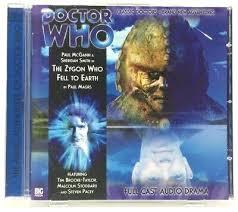
I stopped watching Doctor Who in 2013 after the 50th anniversary special. Up to then I was deeply obsessed by its reams of stories, hidden subspaces and detailed production histories. It wasn’t just entertainment, it was a case study in a massive shared universe, and a direct function of the times and places it had been written.
It’s never been very controversial to anyone I know to dislike Moffat’s run of the show, and as it drew to a close everything that followed seemed pretty well-telegraphed: Chris Chibnall would become the head of the show, it wouldn’t be very good, reactionaries would blame bad writing on a female Doctor while plenty of others would just lost interest, the ratings would drop and the whole show would become less culturally relevant. It was a Cassandra truth.
But that said, I still wanted to try it. I watched a bit of the Twelfth Doctor and had mixed feelings, and when I watched the first episode of the Thirteenth I found myself taking notes on it. So, without a lot of structure, here are my thoughts.
1. New Who treats first episodes as very important, the first moments that we see new Doctors and their statements to the world. Call it a modern tradition - where “Robot” and “Time and the Rani” play the change for comedy before jumping into the week’s adventures, “The Christmas Invasion” and “The Eleventh Hour” are primarily statements of continuity. By Twelve’s first outing the villains themselves become metaphors for change, and now Thirteen delivers a brief speech about deciding to become different while paying respect to the past.
2. Speaking of that speech, I feel like there must have been an earlier draft that connected the plot to these metaphors a lot better. The villain of the story keeps pieces of his past triumphs with him at all times, but these trophies are body parts taken from the dead, and they disgust the Doctor. At least Twelve’s flesh robots were stumbling towards eternity.
The villain as a whole is just what you’d expect from a low-grade Doctor Who monster, I guess. He’s supposed to be on a hunt, which sounds really cool, but this consists entirely of him walking places and murdering random bystanders by touch. He’s not keeping the masquerade up or succeeding in his goals by doing this, and the rest of the story implies that he’s at least shrewd about getting what he wants. The Doctor’s complaints against him center on him being a cheat who can’t do the hunt fair and square and on his desecrating corpses, but she never seems very angry at him over murdering people.
The idea of the Doctor stopping a proper hunt actually sounds interesting to me, especially as someone who sat through all of DWAD’s The Most Dangerous Game. There’s a lot of suspense in dealing with an intelligent, directed killer with a small number of targets, be it in Predator or Day of the Jackal, and a villain that stalks, hides or sets up ambushes could be easier on the budget. Or you could keep the villain the same but add a second member of his species to the setting and have them in competition, conflict on conflict. (That sounds like it’d make a good module for TIMELORD, actually...)
3. The Doctor feels simplified. I don’t mean the new personality of this incarnation, although I think the slight amnesia-until-climax is a bit forced. There’s just stuff that comes off wrong. For instance, things are outlawed in “every civilized galaxy” and the villains traveled from “five thousand galaxies away”. Despite ostensibly going anywhere and anywhen, the show’s always respected some species of distance, in that going far enough away or leaving the universe itself is a pretty big deal (especially since so much of it sticks to Earth). This line could’ve been any distance and nothing else would’ve changed, but it kills the idea of space - how can galaxies be civilized? It feels like the setting is shrinking - the word just sounds big and spacey, and this is the part where the Doctor says that something’s out of place, so big, spacey words go there.
This probably sounds nitpicky, but it feels lazy. Where Davies and Moffat both repeatedly made the Doctor or companions into the Most Important People in History, Chibnall seems to take it as read that the Doctor can just do stuff as the plot demands it. The climax involves her making a jump over a dangerous drop to the gasps of all assembled, but her first appearance is after an even longer fall where she breaks through the ceiling of a train car and isn’t even scratched. She "reformats” a phone into some kind of tracking gadget with six seconds of thumb typing and builds a new sonic screwdriver out of random scrap, which then solves basically every issue in the story. And, naturally, she can pinpoint things from a billion light-years away.
My favorite Moffat story is probably “The Eleventh Hour” because it presents the Doctor with a genuine challenge at his most vulnerable. If he had his regular tools handy then it would’ve been a much more straightforward Doctor Who story, but there’s no time to stop and build a new sonic screwdriver, because people are going to die by the time he’s finished. I wish more modern stories had that.
4. I can’t tell how I should feel about the side characters here. Not the companions, although it feels like Chibnall looked at RTD’s companions and thought “why not bring the entire family along?” There’s just this odd tension in characterization between comedy and drama for them, and without a very detailed soundtrack it’s hard to tell what emotions the script’s trying to go for.
One of the hunter’s victims has spent years trying to find his missing sister after another hunter abducting her. Instead of any resolution coming to that story he just gets murdered without ever knowing what happened to her and then the Doctor commandeers his workshop. (It’s even made clear that these human trophies are all still alive, just “in stasis”, so there’s no reason to think they couldn’t save her and presumably several others.) Meanwhile one of the main characters suffers a short fall and dies, taking up most of the final act with a funeral despite us hardly knowing her.
Other victims are worse. A man throws pieces of his salad at the monster for no discernible reason - he doesn’t even seem drunk, and then he dies as the hunter crushes that salad underfoot. A security officer gives a heartfelt goodbye to his family and tells them what a lucky granddad he is, then walks offscreen to be murdered. Neither of these scenes had to happen, and both together don’t even fill a minute of the runtime, so what was the motivation? The first is at least charmingly odd, but both of them feel like bizarre, extremely cheap set-pieces.
The soon-to-be-trophy himself listens to positive affirmations in a crane, then shouts them as he’s being chased. “I’m important! I matter!” The implication would seem to be that this is goofy behavior, and yet the things he shouts are in some ways the themes of the show. Is this self-critical deconstruction, unabashed humanism poorly delivered, a running gag?
5. The other half of a new Doctor, classic or modern, is this shedding of old things. Not always in terms of showrunners, but sometimes in attitudes or fans. The change from Six to Seven was motivated by a desire to change the tone of the show, for instance. Nowadays this is reflected a lot by the fandom - every Doctor has newcomers who jump back out because they don’t want their hero to be replaced, but the jump to Eleven confronted a lot of younger fans with this for the first time. Then Twelve culled some fans who couldn’t stand the Doctor being old and unkissable, and now Thirteen’s wiped out her own contingent of grognards who think the Doctor being a woman is a radical idea invented in the last three years.
That said, I’m not a fan yet. Some Doctors I don’t like as much for aspects of their characters, particularly Five, but Thirteen just doesn’t feel Doctorly. (To be clear, neither did Twelve.) I grew to enjoy Matt Smith’s performance where I thought I wouldn’t, and I’ve found a lot to like in every Doctor, but for some reason both of them still feel like actors playing the role to me, where Unbound Doctors and Mark Kalita have captured whatever the core is.
6. I feel like I’m getting old. So much of the beauty of Doctor Who just feels transparent now. After Moffat the maximalist decades of worldbuilding can never convincingly pretend to add up to a coherent universe and they can’t escape into the freedom of canon-indeterminacy any more than they already have. Even Big Finish, which I used to adore, feels strangled by a mandate to realize and box-set every possible combination of whatever actors they can summon from the show, no matter how many tedious hours they have to fill with cardboard characters and back-of-the-napkin monsters.
There’s no excitement in the adventure for me, because I know the route and the destination. And I don’t know if that’s Doctor Who being formulaic or disenchantment from seeing the patterns too much, or some personal lack of spark and imagination. I feel like there must be some drive I don’t have, one that would re-energize my own perspective in the face of concrete understanding, that would see it as a good thing that I understand another layer of what I enjoyed so much without sacrificing that enjoyment. But if it’s there, I just don’t see it.
But hey. While there’s life, there’s...
6 notes
·
View notes
Text
I’m rewatching seasons 11 and 12 of Doctor Who.
I just thought to make this post in the middle of episode 3. There are some thoughts I never quite articulated the first time around, and I remember I was somewhat disappointed by a lot of things in season 11.
Note: Yeah, this is a whole lot of criticisms. Doctor Who exists to be criticized. I still enjoy the heck out of it. :3 Not looking for arguments.
Anyway
Episodes 1 and 2 were good, but I had some more specific thoughts while watching.
First off, the whole thing is a bit dark. Not thematically (well, it was, but that’s just Doctor Who sometimes), but in terms of.. idk what’s the term, editing? Visuals. The visuals were weird. It’s like my eyes were drawn to the wrong things, I had to put in some effort to keep up with what was happening onscreen. I’m sure someone with more knowledge about film in general could put it into words, but I remember it being distracting the first time around, so I know it’s not just a fluke. It was weird. Additionally, it had this distracting habit of holding close angles on people’s faces. My family noticed too while we were watching.
Second, something about the dialogue and direction felt a bit off. It struck me as oddly inappropriate and awkward exposition when Grace explained Ryan’s dyspraxia to the others. What sort of person tells strangers about something like that unprompted? She didn’t have to go into it in that moment, and even Ryan seemed uncomfortable and changed the subject. I feel like the writers just didn’t know how to communicate it naturally, because Grace’s character is far too considerate to explain her grandson’s disability to strangers for no reason.
I also felt like every line was delivered... very dramatically. Don’t get me wrong, it’s well acted, but since it was everyone, it must have been the direction. Every. Single. Line. Nothing felt casual, even when the dialogue itself should have been.
That’s not necessarily bad, but everything together was a bit distracting. I never quite absorbed the details of the plots the first watch around.
Another note I’d like to make is that Carl guy. (The target of the hunt. I think his name was Carl? I’m not going to double check.) His whole thing with the little affirmations and that being played like a joke..? I’m not really sure if the joke was “haha look at this loser insisting he’s special and important, how pathetic” or “it’s funny when people struggle with self-esteem,” but it was definitely some kind of joke at his expense. “Haha, Carl is saying he is brave, but he ran away from the alien in the train and is scared of heights. He got this job from his dad and that makes it funnier because...” what, because he couldn’t pull himself up by his bootstraps?
I know I’m going on about this but Carl felt like a stand-in punching bag that tells us the writers (or Chris Chibnall in particular) think little of people who struggle with their mental health and rely on financial help from others to survive. Which really lines up with the grossly pro-capitalism ideology expressed in the later episode Kerblam!.
I also wish Grace hadn’t died. Grace was lovely. That was mean. :C
Smaller notes:
I was a big fan of how they set up the Doctor’s character and her showing a dark side in the way she fuckng melted Tim Shaw’s DNA. But I don’t remember them ever properly addressing that later, which is disappointing. (Maybe they will in season 13.)
Having Yaz be a cop in training rubs me the wrong way. Pro-cop propaganda is never welcome, especially in using people of color to push the agenda. I’m just noticing how common that is in media.
I’m also realizing right now that Grace had the most personality of any of our protagonists so far. This is something I remember being disappointed by at the end of the season, because I still felt like we were getting to know the characters, despite seeing them in the TARDIS for a whole season.
I don’t remember a lot of season 12. I wasn’t in a good place mentally while watching it. Maybe there’s more characterization? Tbh the only things I remember from season 12 are the Salem Witch Trials episode and the finale arc.
Episode 3
Okay, I had way more thoughts on that than I meant to. Sorry about that. Anyway, the Rosa Parks episode is emotionally powerful and has some good jokes. The racism makes me sufficiently uncomfortable, which is probably what they were going for, and all the visual issues the first two episodes had seem to be significantly improved, aaanndd...
I know it’s historically inaccurate, but I’m also pretty historically illiterate so I don’t feel like I can quite say how. I do know that it drastically overestimates how individualistic the whole human rights movement is and was.
I wanted to make this post because of the whole... entire plot? Like, if Rosa Parks didn’t do this thing on this day, she could have done it later. And people were actively fighting and plotting already. Someone else would have done something similar at one point, probably soon. Protests were going to happen. It was just a question of what would trigger it.
Not to blatantly put it in a modern framework, but if George Floyd hadn’t been killed, it would have been the next black person police were caught brutally murdering that triggered the protests and very justified riots. Society was already coming to that point. One person not doing A Thing doesn’t change that.
Killing Hitler wouldn’t have prevented WWII.
In the past, Doctor Who explained the Doctor leaving historical events as-is by calling them fixed points arbitrarily. That works. It’s a cop-out but it works, and honestly this show is all about cop-outs and fun plot holes and just *chef kiss*
This... doesn’t really work. And the racist future man my audio processing issues don’t allow me to know the name of right now thinking Rosa Parks was the entire reason white supremacy is presumably over in his time, and the Doctor believing it too, tells me the writers understand social progress even less than I do.
And those are my thoughts. I will continue adding to this post as I watch if I feel like it. No fighting pls I’m a little baby enby who can’t handle confrontation. But if you want to add some thoughts or correct me on some things or explain what they got wrong historically or like... what was up with the visuals there, please feel entirely free to comment.
3 notes
·
View notes
Text
The Doctor needs a medic!

Clarification: I did a little research after my article last week. That "sister," line from Arachnids was still getting to me. As an American living in the UK, I was unaware of the fact that head nurses were still called sisters, despite them no longer being nuns. So it turns out that the Doctor wasn’t implying she used to be a female, but rather than she was using sexist outdated language. Cool… cool. Can’t decide which is worse. I mean, she is a bit old. Perhaps she’s a bit old fashioned as well. I’d keep an eye on her if she starts reading the Daily Mail.
We’re now at the halfway point of the series. Five episodes in, and I would say this one was, if nothing else, fairly solid. "The Tsuranga Conundrum" may be one of my favourite episodes of the series thus far, and it’s a bottle episode! However, while Chris Chibnall wrote the episode, the alien threat in it was actually devised by writer Tim Price, so it was a bit of a group effort. It would appear, however, that the real antagonist of this story… is time.
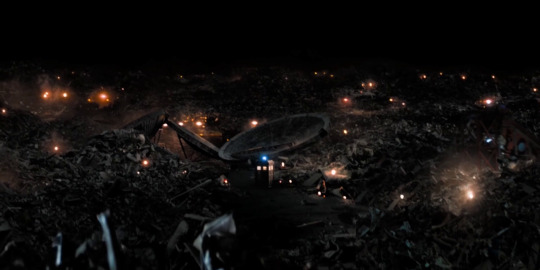
In an odd way, the opening shot of the episode had me thinking of the previous "Arachnids in the UK," with its giant landfill. I almost wondered if they weren’t actually rooting around underground Sheffield. Instead we’re on a planet called "Seffilun 27," in what the Doctor refers to as a "junk galaxy." The planet seems to be covered in junk as far as the eye can see. I was reminded a bit of House from "The Doctor’s Wife," with all of the junk from discarded TARDISes lying around. The Doctor has Team TARDIS sweeping for junk she can use for unspecified Doctory stuff. Instead of finding the desired gadget, Graham discovers a sonic mine that lands them all in the hospital.
The hospital is your typical Doctor Who style futuristic building, all white and sleek. It’s what you’d expect, but there’s a bit more than meets the eye. The Doctor is the last to wake up and feels pretty awful. You can already tell it’s going to be a handicap for her throughout the episode. I was reminded of regeneration episodes where the Doctor is "still cooking," and has to deal with a bit of pain. Nothing really comes from the pain other than a bit of added suspense, which is all fine and good. This is not the only handicap the Doctor will face throughout the episode.
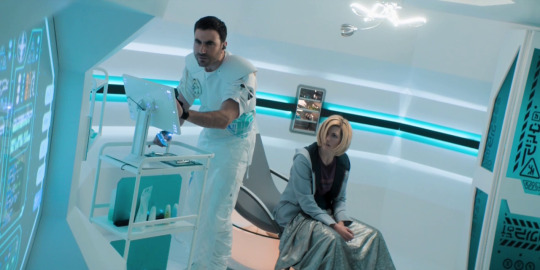
The two attending medics are Astos and Mabli. Both are young, attractive, and seem very capable at their jobs. The Doctor discovers from Astos, the head medic, that they have spent the last four days on a medical ship called the Tsuranga (as opposed to a hospital) on its way to a space station called Resus 1. This causes the Doctor to panic. She’s left her TARDIS behind on a junk planet, where people scavenge, and she’s "only just got it back!" However, Astos reminds her that the ship needs to reach it’s destination for the health and wellbeing of the ship’s passengers. It’s a reasonable argument and the Doctor can’t deny it.
Among the patients on the ship, other than the Doctor and her friends, is Eve Cicero, a famous pilot and general, accompanied by her brother Durkas and android assistant Ronan. There’s also a pregnant man named Yoss (YOSSSSS GAGA! Sorry, had to) who is about to pop. Eve has Ronan manipulating the less experienced Mabli to provide her with adrenaline blockers, all behind both Astos and her brother’s backs. Yoss’ species’ gestation period of about a week, hasn’t given him much time to come to terms with being a father. His anxiety is even further exacerbated by the fact that his pregnancy was the result of a bit of fun at a party. Ryan, who grew up with an absentee father, seems to latch onto this, despite his initial reaction to a pregnant man.

The Doctor can’t turn the vessel around to pick up her TARDIS as it’s locked in on a path, auto-piloted. It only seems to pick up people in distress along the way, acting as a space ambulance. To make matters worse, the ship will be detonated if anyone tampers with it, in case of a hijacking, which seems a bit extreme. Other reasons it may be detonated, would be for quarantine reasons, or if it posed a threat to anyone. Which seems like as good a time as any to introduce our alien threat- Item Seven Alpha Cubed, otherwise known as "Pting." (Probably named after the sound the hull of a ship makes whenever it turns up.)
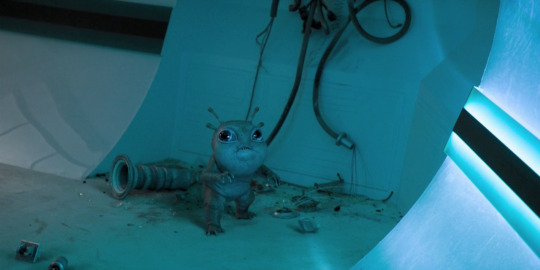
This marks the second week in a row where the reveal of the baddie has made me react with an "Awww!" Look at that little face! What a little cutie. Sadly, that little cutie just caused the death of Astos, as it caused the escape pod he was inside to evacuate, and detonate. I’m not 100% sure why it actually detonated, even without life support. Is part of a ship’s life support system allotted to the not-exploding of things? Regardless though, the Pting isn’t really hostile like a Dalek is hostile, it just seems a bit hungry! It doesn’t seem to eat organic matter, though it makes a right meal of the Doctor’s sonic screwdriver. The cosplayer in me was worried I was going to have to order a whole new piece for a second, but it coughed it right back up! Though it no longer seems to work. Another handicap.
The Pting is a rather resilient little creature. General Cicero had encountered them before as one “massacred” her entire fleet. Their skin is toxic to the touch and unbreakable. It can survive the vacuum of space, and it seems to enjoy eating anything. Think of a mix between a tardigrade, a Gremlin, and Nibbler. The Doctor must stop it from destroying the life support (see: anti-exploding device), and also from alerting the people back on Resus 1 from detonating the ship as well. They also need to keep the little muncher away from the ship’s anti-matter generator, so the heat is on!
One of the things I’ve been paying close attention to this series is whether the companions are utilised properly. The decision to have three over the usual one is something of a self-imposed challenge. Writing for an ensemble is far more difficult than the usual duo. Even classic Doctor Who struggled to balance three companions at times. I mentioned previously Nyssa’s TARDIS naps. Graham gets a nice little moment where he questions Durkas as to why he’s looking into his sister’s medical records. His friendly, yet direct approach was as though he was channelling the Doctor. He seems to be taking her example to heart. Yaz gets put on guard duty with Ronan, protecting the anti-matter generator. And Ryan and Graham both get a bit of screen time as doulas helping Yoss through labour. I had my second "Awww!" moment when Yoss requested other men be there as support. It was cute, shut up.
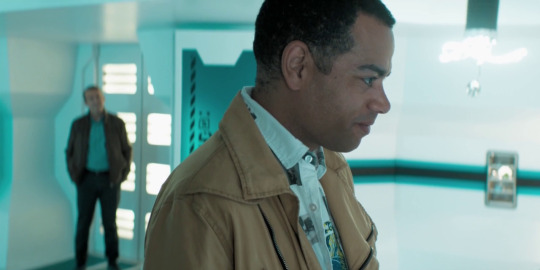
While Yaz and Ryan were gathering up the people on the ship for an emergency meeting, they have a little heart to heart in a corridor. I couldn’t help but feel like this bit felt tacked on. The ship is in danger, and they stop to talk about how Ryan’s mum died. It stopped the momentum of the episode cold in its tracks. The only reason I can think they added it in at this point, was because they couldn’t think of a better place to put it. They needed to divulge Ryan’s backstory so they could tie it in with Yoss’ fatherhood. This seemed more of a writing choice than a directing choice. It’s fine, really, but not very graceful.
There were some really good Doctor moments in this episode. I loved her claim that she has a doctorate in Lego. It’s funny because in my classic-Who rewatch, I’m currently on "The Edge of Destruction," and the Doctor’s speech about anti-matter reminded me a bit of the First Doctor’s monologue about the formation of galaxies. I will say though, it fell short of some of the better Doctor monologues we’ve had in the past. Regardless, it was nice to see the Doctor nerd out on science and show her passion a little. My only real issue with the Doctor’s characterisation in this episode stems, once again, from her morality.

Chris Chibnall doesn’t seem to know what his Doctor’s stance on guns actually is. It’s not ok to shoot robots or dying spiders, but it’s way okay to shoot the Pting? Yaz and Ronan are both given staser guns to guard the generator. While I am glad to see such an old reference return (as well as the stethoscope!), I’m once again confused by what Chibnall considers an ok time to shoot something. Funnily enough, this episode is exactly how I think the Doctor’s attitude toward guns should be portrayed. Nothing can really kill the Pting, so it’s really tantamount to a Star Trek officer using a stun setting. But the main idea was that the gun was used as a defence, to protect life and because it was the best option. That should always be the Doctor’s attitude toward guns- are they the best option? The best hope? She’s a Doctor of hope, so of course, she always looks for the best option, but she’s not stupid either. In a lot of ways, that’s what she’s done this series when it comes to guns. But it’s in the dialogue where her aims get muddled. I agree with Chibnall. The Doctor should have a disdain for guns. Guns are the end of hope in most cases. But sometimes River shoots the Silence, Leela shoots some guys in a corridor, and the Brigadier holds off an invasion.
With Astos dead, it’s up to Mabli to take control of the situation, which in her case means considering what’s best for her patients. With Yoss in labour, she needs to help him deliver his baby. Wisely, she allows the Doctor to do what she needs to do to save everyone’s lives. With the Pting eating at the ship's systems, they decide they need to find a quicker way to get to Resus 1. They must fly the ship themselves, which will also alert the security protocols, causing it to detonate, but one thing at a time. The Doctor finds a way to bypass the ship’s auto-pilot and has Durkas, an engineer, build a makeshift neural interface with the piloting system. It’s revealed that due to her years of flying with a neural interface, Eve has developed a condition known as "Pilot’s Heart." Due to this, adrenaline has built up in her system. One big jolt could stop her heart and kill her. The Doctor offers to fly the ship, but Eve insists she’s the best woman for the job, despite the dangers involved.
Around this time Ryan and Graham are learning to rise to the occasion as doulas. Yoss is in full labour panic mode, and needs his guys there to cheer him on! Yaz and Ronan have to grapple with the Pting. After stunning it unconscious, Yaz wraps it in a blanket and bends it like Beckham down the corridor. Go Yaz! The Doctor enters the scene looking for the ship’s detonation device. Clearly, a ship in deep space is too far away for missiles, so the bomb must be onboard. It’s a bit contrived that such a device would exist, but the aforementioned reasons are fine. Whatever. Around this time, the sonic screwdriver boots itself back up, and the pieces all come together for the Doctor. The Pting isn’t eating matter, it’s eating energy.

The Doctor and Yaz locate the bomb and move it to an airlock. She speeds up the detonation so that the building energy attracts the Pting, and just before the device explodes, the Pting swallows it whole, with an adorable look of delight on its little face from the warm glow its tummy. Seriously, as Who monsters go, this thing is freaking cute. The Doctor ejects it from the airlock, and that’s two threats taken care of in one go. Two birds, one stone.
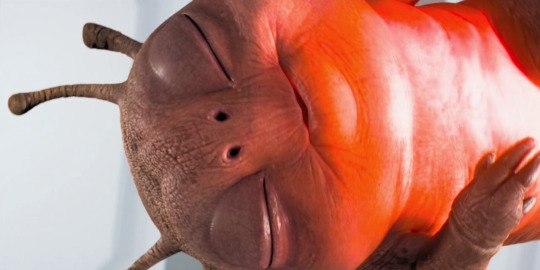
The imminent threat of piloting the ship still looms. While hooked into the interface, Eve was able to control the ship, despite the less than ideal conditions. But without any more adrenaline blockers onboard, her heart gives out on her. She dies a hero, but her work is unfinished. Durkas must now rise to the occasion as a Cicero. It’s more of a poetic solution than logical. Being related to a pilot somehow makes you a better candidate to fly the ship than the Doctor herself. But he does a fine enough job as he flies them to safety.
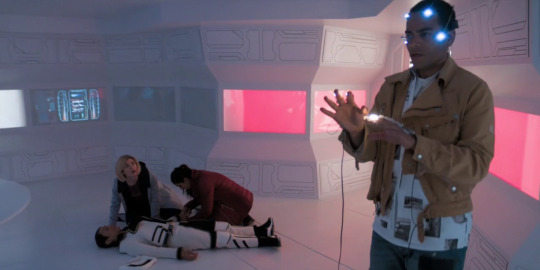
Yoss has his little boy, Avocado, and Ryan and Graham seem like they’re getting along, but Ryan leaves Graham’s fist bump hanging. And I gotta say, what the hell is Ryan’s deal still? I mean, come on man. He’s stopped asking you to call him granddad, but you could at least give the dude a fist bump. It’s getting to the point where I’m starting to think Ryan is being a bit of a dick toward Graham. Perhaps he’s closed off because the men in his life have abandoned him, but this is getting ridiculous. They’ve been through five onscreen adventures, and several offscreen adventures at this point. They’ve been through a lot, to put it lightly. Travelling with the Doctor should be far more of a bonding experience. While it is better to show than tell, Ryan’s standoffishness to Graham is getting old. Graham seems to take it in stride though. You’ve gotta give him credit for that.

Now on Resus 1, Ronan will probably shut down with nobody left to serve. Durkas apologises for not being kinder to him in the past. It’s weird that the Doctor doesn’t offer to take him to some sort of android planet or something. I kind of expected it. Yoss has decided to keep Avocado. Ryan, who was a big part in this decision, helped him come to grips with the idea of being a father by telling him that a father doesn’t need to be perfect, he just needs to be there. The Doctor and her friends are given assurances that they’ll be taken back to the TARDIS after they give their statements. The episode ends with Ronan reciting a kind of litany that Durkas, Yoss, and surprisingly the Doctor all know by heart. All in all, it’s not a bad way to leave the episode. In comparison to last week, there is far more of a feeling of resolution.
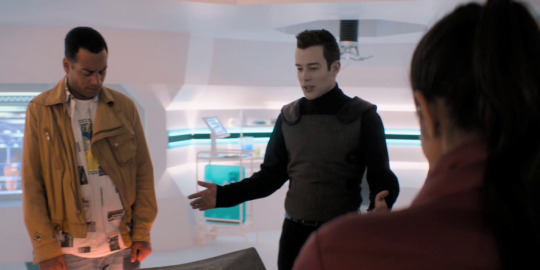
As I said, this episode was pretty solid. But one of the things I’m still holding out to see from this series is Jodie’s big "wow," moment. This is in no way me saying she has failed to wow me as the Doctor. I’ve not hidden my total joy over her performance. What I am waiting for is for the fury to come out. Christopher Eccleston spent a good chunk of his series being either sad, bossy, or silly. But when the episode "Dalek," came around, we got to see another side to his Doctor- his scary side! How about with the Tenth Doctor doomed the Family of Blood to an eternity of torture? Or how about when Eleven stared down his companions with intimidating eyes because he could see they were lying to him? I’m still waiting for Thirteen to get scary. We saw it come out in a microscopic amount when she warned Krasko not to threaten her. But I’m still waiting for that moment.
Thus far she’s been a rather friendly and forgiving Doctor. She’s shown more compassion than contempt. I’m waiting for one of the writers to give us a truly morally ambiguous moment of the Doctor. And no, having conflicting morality about guns doesn’t count! I was hoping that this episode would be the one. We would finally get that truly contemptible villain, and we’d get to see her dark side come out. If they’re going to make the brave decision of excluding Daleks and other classic baddies, we deserve a new one of the same calibre. What this episode gave us instead, was a pretty solid base in peril episode. I won’t fault it for not being the big evil monster I was hoping for, because what we got instead was pretty effective.
Again, we’re only halfway in. There’s plenty of time to up the stakes. We need a good dose of danger. I’d like to see some more planet threatening terror. We need more timeline meddling other than one racist pissing in the wind against change. But despite the lack of fear, this episode had one thing going for it above all else. This episode had a lot of heart. It may not have been a heart-stopping thrill ride, but in there were real moments of joy. Having a threat that was so cute was actually a welcome surprise. It wasn’t trying to be a big bad villain. Here’s to hoping that the second half of series eleven amps up the danger factor!
#Doctor Who#thirteenth doctor#jodie whittaker#chris chibnall#pting#ryan sinclair#yasmine khan#yaz#graham o'brien#the Tsuranga conundrum#series 11#bbc#tardis#sonic screwdriver#time and time again
19 notes
·
View notes
Text
Who Reviews
Doctor Who: The Witchfinders, written by Joy Wilkinson. In the history of Doctor Who we've had three stories both written and directed by women. The last was Barbara Clegg's Enlightenment in 1983, an unusual story which stands out from its era and is easily one of the best of the 80s. The Witchfinders is a very solid tale, and you might say it succeeds as a traditional Doctor Who story more than any other this year. I've seen someone on Twitter call it the best so far and I can't concur with that, but this is a good opportunity to look at what's really been happening with Doctor Who this year overall.
Chris Chibnall as showrunner has brought us a Doctor Who which functions better as Genuine Adult Drama (GAD) than the Davies and Moffat eras did. You can feel the influence of Davies, but they've shaved his trademark silliness off the whole thing for a more muted feel to the proceedings. This is paired with an anamorphic desaturated feature-film look to the visuals. At times the series even feels bland and flavorless, but at its best we feel the weight of the adult concepts the TARDIS team are faced with - American racism in "Rosa" and the British-sparked conflict between Muslims and Hindus in "Demons of the Punjab." The Witch trials of the King James era are a weighty, depressing subject, and it seems a little bit of a shame to bring traditional Doctor Who alien monsters into it. To the episode's credit, it goes full horror movie with this. There's some CGI but it's mostly makeup straight out of a zombie film - specifically the Evil Dead series. It feels too scary for kids, and Doctor Who should occasionally feel like that. And oh, let's talk about King James. Russell T. Davies established the traditional of the "celebrity historical" where The Doctor meets a well known historical (or sometimes fictional) personage, often played by a recognizable guest-star actor. So here's Alan Cumming, a big-name actor coming in to play his part as an absolute lark. Openly gay and affecting a comical upper-class Scottish accent of some kind, he's a delight throughout, whether flirting with Ryan or trying to learn The Doctor's secrets. The half-comedic performance does undermine him a bit as a threat, but it's nice to see a guest actor having fun with a part. Cumming is a smart enough actor to never go fully over the top with it, pitching his performance at the right level so that it doesn't break the scene. The three companions have been reliably good, but not in a showy or cartoonish way. They only occasionally get standout moments. There's a lot of humor and energy to Jodie Whittaker's performance as The Doctor, which is not unlike David Tennant's popular Doctor, but it often feels like that energy is muted by everything else around her, as if she's acting in a tank of water. The Witchfinders is the first episode to show The Doctor struggling to get anyone to take her seriously, due to her gender. King James doesn't recognize her as being in charge, and she's sentenced as a witch and drowned. I'm glad an episode dealt with this, but it also speaks to a fundamental, and peculiar, powerlessness inherent to Jodie Whittaker's version of The Doctor. In the 60s-80s series, it was common for The Doctor to be mistrusted by everyone at the beginning of a story, and locked up until he could prove his worth. Jon Pertwee's Doctor spends much of Frontier in Space going from one prison cell to another. The faster-paced post-2005 series rightly dispensed with that as padding they didn't have time for. Psychic Paper was introduced to give The Doctor credentials and credibility at the beginning of a story, along with other tricks often involving the Sonic Screwdriver - which by this point is an all-purpose tool but can also be used for its traditional purpose of opening locks to get The Doctor - and the writer - out of a dead end. The Psychic Paper fails The Doctor in this one, as King James doesn't respect a woman's authority. It was usually easy for The Doctor, as played by Eccleston, Tennant, Smith or Capaldi, to talk his way into a position of authority, and Whittaker's Doctor managed that in her first scene. But increasingly it's become apparent that The Doctor is not doing an amazing job of solving every problem in an episode like an all-powerful God, or kid's TV hero. The Davies and Moffat eras often wanted to show you how amazing and powerful The Doctor is. This Doctor keeps ending up with endings in which some immediate threat has been vanquished, but larger societal problems linger, and people we care about are dead. Last week's episode, Kerblam!, set up an apparently dystopic capitalist future, where an Amazon-like retailer had replaced 90% of employees with automation, and was required by law to keep a 10% human workforce. The employed workers were treated like machines, and were miserable, and the unemployed were apparently living in even greater misery and poverty. The episode couldn't, or wouldn't, imagine an automated future where the unemployed are cared for. Capitalism can't imagine that either. The Doctor sees that misery and doesn't do much to help. She solves the immediate problem that is killing workers, so that the company can keep on running, more or less as it did before. This has been something of a running theme. The Doctor doesn't fix anything for citizens of this galaxy at large. The Doctor can't improve the racism of 20th Century America, only observe it and make sure that Rosa Parks' protest happens as scheduled. You could say the same about the border dispute tearing India apart in 1947. History isn't changed, only observed and mourned, and the role of the colonizing British in creating his situation is not dealt with in any overt way. Grace dies in the course of The Doctor's first adventure. The Doctor feeds the dangerous Pting, calming it for awhile, but sets it loose afterward. We never see The Doctor deal with the giant spiders or, more importantly, the toxic waste that created them. That waste was itself the product of deregulation under the laissez-faire rule of Chris Noth's Robertson, an uber-capitalist narcissist psychopath who is compared to Trump (though not as vile). The Doctor and Ryan are seen to trap the large spiders for a natural death, but what happens after that is not dealt with onscreen. Instead we get this companion team officially joining The Doctor in the TARDIS. In every episode this year, we witness a very messed-up situation, often caused by some intersection of capitalism and racism. But it's not a situation The Doctor can fix by the end of the episode. She can only mitigate the stranger, monster-based elements, the threat that they're facing immediately in the moment. She removes whatever is gumming up the gears of progress so that the actual horrors of the society in question can continue unchallenged. Of course in the more historically-based episodes it's too much to ask that The Doctor Solve Everything, in capital letters. Is she supposed to solve racism? But the more fantasy-based episodes like Kerblam! have much less excuse. It's telling, I think, that these episodes overall are better at dealing with America's failures than Britain's. The Doctor is powerless to deliver a truly happy ending, or even to show she's trying for one, and I wonder if that's intentional or due to a lack of political consciousness on the part of the writers and showrunner. This year on Halloween, the leftist Youtube channel Philosophy Tube did a piece about the horrors of the witch trials, and how they were used to break the power that women had in a feudal agricultural society, including traditional medicine, and how this led to modern capitalism. He covered the same material on Twitter, and I'll link to that here. https://twitter.com/PhilosophyTube/status/953277894813536256 https://www.youtube.com/watch?v=tmk47kh7fiE "The Witch-Hunt is classic Divide and Rule: paint women as dangerous so the new proletariat are busy fighting 'witches' instead of joining together and fighting the rich. There are massive rollbacks of women's rights … Records were often kept of how much land or money was seized from them, but not how many were murdered." It's an interesting take on just how bloody the transition to an industrial capitalist society was, and how the people and their "old ways" had to be broken for this to happen. It was a means of controlling women's options, and the options of the average worker, something that's still relevant to today's society. In some ways we still live, today, in the cages that the witch-hunters built. Today's politicians like Mike Pence are just witch-hunters in different clothes. And that's something this Doctor Who story doesn't deal with. I've mentioned this, but when the Rosa Parks story was announced, I saw a lot of people on Twitter, who aren't Doctor Who fans, assuming that a Doctor Who take on Rosa Parks would by nature have to be a disgusting exercise in tastelessness. Maybe they thought The Doctor would be taking on some kind of Racism Monster. Apart from introducing The Doctor and a villain into the proceedings, "Rosa," as an episode, was tastefully done. While it didn't show clearly that Rosa Parks planned her protest beforehand, it did show that Parks was an activist who planned her actions alongside others (including Dr. King), which is more than many history books do. But their fears were not unfounded. It's common for pop culture to create extended and elaborate metaphors about bigotry as if they're making some grand statement, but also reinforce that bigotry as somehow justified along with it. In Disney's Zootopia, there are classes of predator and prey animals, and the predators are discriminated against and find it difficult to get ahead in society. This is a metaphor about racism, but it would be entirely justified for a rabbit to be afraid of a fox. In the wild, a "predator" would eat the "prey" animal. If this is truly taken as a metaphor for white racism against black people in America, it's an offensive one. Race is a social construct, and racism as we know it was created to enforce slavery. It established people with dark skin of African descent as an underclass, to exploit in order to grease the wheels of capitalism in the centuries before the Civil War (and afterward, if we're being quite honest). Black people and white people are genetically identical, and without the shadow of slavery (created by the rich to enrich themselves) would have identical rights. Foxes and rabbits are not genetically identical. One is likely to eat the other. In the X-Men series, mutants are feared and shunned by society. They have superpowers from birth, and are genuinely extremely powerful and potentially dangerous. So if the public fears them, that's actually entirely justified. The mutants are different from "normal" humans and could assert their power in very dangerous ways if they wanted. Wolverine is virtually an immortal with knives for hands. Phoenix could easily destroy the earth. The endless comics, TV series and films featuring the X-Men have positioned Xavier and Magneto as the "Dr. King" and "Malcolm X" of their story, in that Xavier wants mutants to have equal rights and is more palatable to the mainstream, while Magneto is "too radical." But this is an offensive metaphor when you break it down. Of course neither Xavier nor Magneto are black Americans. Both Dr. King and Malcolm X were considered extreme radicals in their time, and they agreed on many concepts. Dr. King spoke out for worker's rights generally, and for class consciousness. He was murdered for his beliefs. Magneto has magnet powers and runs a club called "The Brotherhood of Evil Mutants" which seeks to dominate over humanity. He's a bad guy who does bad things and constantly emperils the world in general. Comparing him to a 60s civil rights leader is an offensive metaphor, unless you accept that the X-Men series just wants to touch on the history of bigotry in America as subtext without accepting everything that comes with it, which is fair enough. It's not a history lesson. But like almost all sci-fi stories, it makes no sense without our understanding of how black people and other groups have been marginalized in America, but makes the story about white people instead, like a cartoon fox played by Jason Bateman. The history of slavery, oppression, bigotry, Nazism, fascism, and so on is the subtextual backstory for pretty much all sci-fi media. So many villains are based on the Nazis, but this rarely takes into account the racist ideology behind fascism. Hitler came to power after Germany's economy had collapsed, partly due to the Great War. The average worker was living in hopeless poverty, and either they were going to develop class consciousness and tear down capitalism, asserting their rights as a worker, or they were going to need someone to blame. Hitler gave them someone to blame. He rounded up the socialists, communists and Marxists who were preaching against capitalism. He blamed it all on the Jewish people, who traditionally had been excluded from many professions and were often involved in banking. It was apparently easy to make up conspiracy theories about them Actually Being in Charge of Everything. He rounded up the LGBT people, burned gay and trans literature. He targeted the Romani "gypsies" who had been marginalized for centuries. There was no logical underpinning behind this. There never really is, with racism. Hitler only wanted power, and he saw that the people had lost faith in the world, with capitalism and their government. They were being oppressed by economic depression, and had a general unfocused rage. He used that anger and directed it toward groups that were already marginalized in some way. He distracted the people and consolidated his power by giving them something to hate. He slaughtered six million Jewish people in an apparent bid to wipe an entire religion off the face of the Earth - the religion which gave us Christianity, for that matter. Since the 80s, Capitalism and greed has gone unchecked by any desire to actually help people and have a functioning society. After George W. Bush's trillion-dollar wars for oil, the economy has crashed and not really gotten better. People are noticing. The rich are getting obscenely so, as if they're being gifted the equivalent of a brand new car every few seconds. The poor are begging for scraps. There is a general unfocused rage. Donald Trump, a fake billionaire, has gotten a large chunk of America to blame it on non-white minorities, such as people from Mexico. This is what Hitler did. I've gotten way off topic, but for a reason. The people who burned witches in the 17th century and thereabouts were not actually killing people who had any magical powers. They were murdering their neighbors, and consciously or not it helped the world change. The world's economy was changing. Land was being seized. Power was shifting. People were losing rights and property they had previously been entitled to, as part of a series of steps which led to factory work in the 19th century. They killed women to kill off the old ways. And I'm watching a rather good Doctor Who episode about that, about killing witches to "fight the powers of Satan," and it turns out that in this episode they actually have good reason to be killing off their neighbors, or to fear the powers of Satan, because there's actually some evil alien stuff going on, and it's infecting people and raising people from the dead and it all looks very scary and supernatural. If you're in the mood to be offended it does feel a little like a Witch Trial but with Actual Witchcraft, portraying the witch-hunters as absurd and awful but also somewhat vindicated by the events of the story, not unlike our X-Men and Zootopia examples. So it's a good Doctor Who yarn, but as a metaphor it doesn't even get started. The episode isn't that interested in the larger societal issues at play here, although it does deal with sexism, which covers a lot of that territory in a general sense. It largely focuses on female characters (except for King James), and both the writer and director are women, for the third time in Doctor Who history. And that's been due to sexism. There haven't been a ton of women writing Doctor Who, or directing it (despite the big-name appeal of Tank Girl director Rachel Talalay). And that's a problem. And it's a problem the show has temporarily solved, by hiring women for this week only. The larger cultural problem remains. And the show keeps fighting for diversity, this year. British writer Malorie Blackman OBE handled "Rosa" with real sensitivity. And Vinay Patel handled "Demons of the Punjab" with full awareness of its historical background. Between them they've probably delivered the two best episodes this year. Indeed these have all stood above the episodes credited to Chris Chibnall. The diversity this year has been welcome, as it's resulted in some good television. But like The Doctor's actions in these episodes it's just a band-aid placed over any larger cultural issues. She can stop the problem of the week, but she really can't fix everything. Which is fine. Realistic, even, which fits the tone of this year in general. My question is, does she want to fix everything? Are The Doctor and her writers socially aware enough to use these larger issues responsibly? So far, in terms of social consciousness, this year's Doctor Who raises a lot of questions it can't actually answer. Not in a way which satisfies the kids, or the adults - for different reasons. It's still very good television, and I'll give it points for asking some of these questions in the first place.
#doctor who#jodie whittaker#the witchfinders#thirteenth doctor#chris chibnall#who reviews#philosophy tube
8 notes
·
View notes
Text
20gayteen tv roundup
despite no one asking for this, i’ve rounded up my favorite tv shows & seasons from 2018. apparently i am an amateur tv critic or something. note: this list is presented in no particular order.
- a series of unfortunate events, season 2

esme squalor! the quagmire triplets! nathan fillion! a painfully relatable satire of the healthcare industry! this show continued to do the book series justice in season 2, while also adding some great elements such as footage of jacques snicket and musical numbers with NPH. i continued to adore this adaption while being exceptionally pleased with each casting decision and character introduction. i am all too ready for the concluding season to premiere (in two days!).
- jessica jones, season 2

(gif credit)
wrapping up with the most painful female break up of all time, this last season of jessica jones did nothing but deliver. i was enraptured with this season and its every storyline, including the insight we were given into jessica’s past and the exploration of how she is faring these days post-kilgrave. malcolm and trish’s characters also grew in ways that were sometimes wonderful and sometimes hard to watch. i appreciate how the characters in this show are complex and flawed and imperfect-how sometimes you hate every choice they make, but at the end of the day they are still redeemable. it remains to be one of my favorite shows of all time. plus, trish’s “i want your cray cray” was a showstopper.
-santa clarita diet, season 2

(gif credit)
i feel this show does not get the attention or praise it deserves. it’s sharp, witty, intelligent, hilarious, and well-delivered. and i’m in love with both joel and eric, as well as their father son seafood business.
-one day at a time, season 2

(gif credit)
there was a point in the beginning of this year where netflix just kept cranking out amazing second seasons of my favorite shows, and one day at a time was definitely a highlight in that. continuing to be relevant, sensitive, and forward regarding contemporary issues and today’s political climate, this season gifted us with elena standing up to her dad, the introduction of syd, another amazing episode on depression, and an incredibly well done flashback episode set in 2001 (which, by the way, did a really good job of making me recognize how old i am becoming). this show is just what the world needs right now.
-queer eye
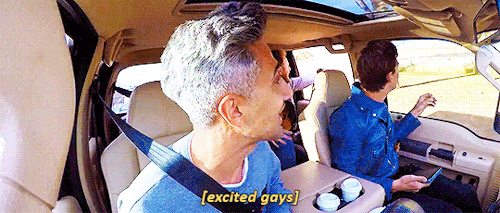
(gif credit)
another show the world needed. the queer eye phenomenon came out of no where and left us all following the fab five on insta, to the point where sometimes i forget why (i mean, how many figure skating vids can one post, jvn?). but way back at the beginning of the year we were all snapping along to jvn’s self love, thirsting over antoni, appreciating the hell out of tan, forgetting about bobby, and crying over karamo’s heart-to-hearts. the fab five have just become a part of our culture at this point, and queer eye was definitely a founding factor in 20gayteen.
-the good place season 3
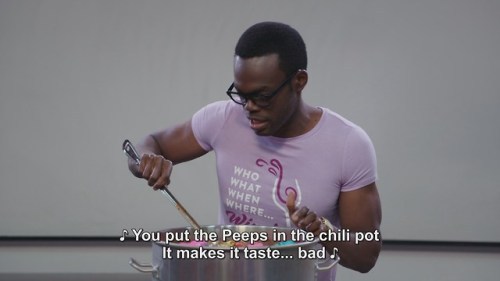
okay, so this one is technically still going on, but it still deserves a spot on this list. the writers of this show continue to amaze me with their ability to keep this show, well, good, despite the unexpected places they take the plot. the writing is smart as hell and takes me back to my college years (yeah, I remember stuff about Kant, sure) and actually laugh out loud while watching it, making me the most annoying roommate ever (sorry, may). this show returns from a month hiatus in about a week and we are all ready for it.
-doctor who, series 11

(gif credit)
look, i’m gonna be honest, i’m not....a huge fan of this season. the TARDIS feels a little crowded, the relationship between the doctor and her companions feels superficial, there’s no arc connecting any of the episodes, a lot of the episodes are just okay, and i’m still waiting to see some darkness in this doctor. but nevertheless, chris chibnall & co. have given us some gifts in the form of episodes, specifically “rosa” and “demons of the punjab.” i can also say that doctor who is definitely more...feminist than it used to be, which is always welcome. oh, and graham is a treat.
-chilling adventures of sabrina, season 1

taking place in the same universe as riverdale, but somehow exponentially better, is chilling adventures of sabrina. it’s rather dark, but also carries a very dry humor that is charming as hell. it’s another example of a show with a complex cast of characters you can’t tell if you love or hate, with the excpetion of ambrose of course. they even blessed us with a christmas (really Yule) episode! i have high hopes for season 2, despite the fact that riverdale went way downhill during their second go-around. but this ain’t the cw, folks.
-daredevil, season 3


(gif credit)
somehow daredevil has roped me back in this season despite the fact that i previously felt myself drifting away from the series. matt remains to be the most infuriating hero to put up with, and yet you can’t help but love him regardless. foggy continues to be the hero we truly deserve. the karen-center episode “karen” completely blew me out of the water. and of course, we are introduced to benjamin poindexter, who, if you follow me on twitter, you know i am obsessed with despite the fact that overall he is a very bad person. in my defense i find his character fascinating as hell. this is a season of a show that completely blindsided me in terms of how good it actually was. so i guess i’m still in this, at least for now.
#a series of unfortunate events#queer eye#daredevil#doctor who#chilling adventures of sabrina#one day at a time#santa clarita diet#jessica jones#the good place#journal#i guess i actually blog sometimes#2018#20gayteen
1 note
·
View note
Text
Doctor Who: Why a Smaller ‘Fam’ is Good for the Show
https://ift.tt/3lqW1du
It’s been confirmed that Doctor Who is saying goodbye to two of its companions – Tosin Cole’s Ryan Sinclair and Bradley Walsh’s Graham O’Brien – both of whom will leave the show in New Year’s Day special ‘Revolution of the Daleks.’
Though not as dramatic as the announcement of a new Doctor, the departure of a companion always signals a shift into a new era for Doctor Who. It heralds a change in dynamic, a change in story arc and the potential for the Doctor to show a new side. Sad as it can be, it means renewal, a theme that runs through the heart of the snow.
Along with almost everything in pop-culture these days, giving the brand-new Doctor no fewer than three full-time companions was something of a divisive choice. The merits and drawbacks of the decision, from showrunner Chris Chibnall, to surround the Doctor with such a screentime-gobbling ‘fam’ has been brought up plenty of times in fan discussions about the show in recent years.
But it’s not just simple maths (one TARDIS minus two characters = more fun with the Doctor) which makes this an exciting decision. Here are a few reasons why Graham and Ryan’s departure could be a game-changing moment for the series…
This could be a fan-favourite episode in the making
Doctor Who fans won’t need reminding that ‘character farewell’ episodes have provided some of the biggest and (arguably) best moments since the series returned to our screens in 2005.
From the gut-wrenching emotional wallop of David Tennant and Billie Piper leaning up against plasterboard walls in ‘Doomsday’, to the gut-wrenching emotional wallop of Catherine Tate not having a clue who David Tennant is in ‘Journey’s End’ – these episodes and others like them are legendary in the fandom, and some would argue that Doctor Who needs a bit of legendary-ness right now (although, for the record, I personally liked all the Master/Cybermen stuff last season).
It certainly sounds like Chibnall, his actors, and the BBC press team are keen to evoke memories of previous tragic goodbyes: Bradley Walsh has described his final episode as “dramatic […] sad […] poignant”, Cole has called it “emotional”, Whittaker said she was “absolutely devastated” by it, and Chibnall has gone all-out with his promise of an heart-rending goodbye.
Chibnall said at a press event, “I can tell you that it’s very emotional. We’ve all been in tears watching it. […] So, yeah, without spoiling anything, it’s hard, but we don’t shy away from what it means for this family to have its final moments together. It was emotional off-screen. It’s emotional on-screen.”
It’s going to be emotional, basically, like some of the biggest fan-favourite moments in years gone by. Saying that, is ‘favourite’ the right term for something that might make you cry if you think about it too much?
Yaz (and the Doc) could finally have space to grow
Graham and Ryan will leave a very different show in their wake (tragic funeral pun very much intended… not that I have any clue what’s going to happen). With two fewer people on Team TARDIS, there will be more time in the average episode for Jodie Whittaker’s Doctor and Mandip Gill’s Yaz to do their own thing.
Gill has already been quoted as saying that there’s “more to come” for Yaz, which will be music to the ears of a certain sect of fans. We’ve long wanted to see more from Yaz than spouting exposition, repeating what other characters have just said, and asking simple questions for the sake of the audience.
Of course, we’ve already started to see more of Yaz’s personal life: we’ve seen glimpses of her skills as a police-trained investigator, and last season we saw flashbacks to her earlier struggles with her mental health. Despite all that, it’d be hard to argue that Yaz feels like a fully fleshed-out character at the moment, and that’s probably down to the fact that she hasn’t had a lot of time in the spotlight.
Read more
TV
Doctor Who: John Barrowman to Return in Revolution of the Daleks
By Louisa Mellor
TV
Doctor Who: Why Jodie Whittaker’s Doctor Needs an ‘Everybody Lives!’ Moment
By Andrew Blair
Likewise, Jodie Whittaker’s version of the Doctor could benefit from having more time to shine. So far, she’s had three other characters to jostle with every episode (not including guest stars), and she’s also had some fairly huge plot events to dash through. That doesn’t leave a lot of time for her own personality to develop, which is probably why ‘jolly’ is really the only word that comes to mind to describe her. (Here’s why we think that Whittaker’s Doc could do with her own ‘everybody lives’ moment.)
Once Graham and Ryan have said their tragic farewell, then, we could be looking at a show led by two talented actors, both of whom will now have more time to develop their characters and show us further facets of their personalities. Here’s hoping that Chibnall and co.’s next wave of scripts allow these characters to reach new levels and prove what they’re capable of. (Fingers crossed they don’t announce three new companions on New Year’s Day.)
Different types of stories can happen now
Think back to Donna and Rose again – they both had tragic farewell episodes, sure, but long before that, the groundwork was being laid. We were given plenty of time to get to know these characters and lots of reasons to care what happens to them.
Particularly with Donna, I think a large part of why she became so beloved is that she had so much breathing room. There were plenty of ‘two-hander’ episodes with Donna and the Doctor (the DoctorDonna… sob!) bundling into a situation and working it out together, and there were even one-hander episodes like ‘Midnight’ and ‘Turn Left’ when Donna and the Doc got to have solo adventures which put them through the wringer and firmly under the spotlight.
You couldn’t really say the same for Yaz, Graham and Ryan, none of whom have had an episode off – or a proper solo adventure – since joining the show in 2018. You can partly blame the format of the show for that: back in Tennant and Tate’s day, there would be 13 episodes per season, and Russell T. Davies had to get creative to cram them all into a humanly-possible shooting schedule (hence the one-handers, which would be shot at the same time); whereas now, we have 10 episodes per season (and next year, due to Covid-19, only eight), and Chibnall has been cramming the whole gang into all of them.
But with the ‘fam’ reduced from four to two, after ‘Revolution of the Daleks’, hopefully, we could see a return of two-handers. And perhaps one-handers at a push. Let’s not forget that Peter Capaldi, as recently as 2017, was running around that space castle thingy on his own.
I’d settle for two-handers, though: adventures where the Doc and Yaz show up somewhere, work the room, interact with the locals, and start putting the puzzle pieces together. You could have an A-plot for the Doc and a B-plot for Yaz, or you could even keep them together throughout and stick to one narrative throughline.
Compare that to the last couple of seasons: Chibnall has generally split the ‘fam’ into at least two teams per episode, and giving them each something to do has resulted in A-plots, B-plots, C-plots and sometimes even D-plots fighting for focus.
This, I’d argue, is why the show has recently resorted so often to quick fixes, which serve only to remind us of a character’s personal life (Ryan spending a few seconds with a basketball, or Graham spending a few seconds grieving) rather than diving deep – because there simply aren’t enough minutes in an episode to do it all justice. But with some of these subplots leaving with Walsh and Cole, Chibnall will have freed up some time and space for different sorts of stories to be told.
Guest stars could have a greater chance to shine
This may seem counterintuitive, given the exciting potential for Yaz and the Doctor to grow as characters in Doctor Who Season 13, but still, it’s worth saying: only having two core cast members to serve will give future guest stars much more of a platform on which to perform.
Think of the brilliant actors that have already appeared during Jodie Whittaker’s tenure as Doctor: we’ve had British TV staples like Stephen Fry, Lenny Henry, Sharon D. Clarke, Lee Mack, Alan Cumming, Mark Addy, Brett Goldstein, Julie Hesmondhalgh, John Barrowman and James Buckley; we’ve had major regenerations for famous characters, played by Jo Martin and Sacha Dhawan; we had Goran Višnjić and Robert Glenister both in Tesla episode alone, and countless other stars of past, present and future.
But how many of those talented folk were allowed proper room to breathe, create a character, and leave a mark on the show? Perhaps only Clarke, Martin and Dhawan, you could argue. And even they had to cram it in pretty darn quickly.
And so, as Season 13 begins to materialise, we will no doubt be treated to the usual flurry of announcements for upcoming guest stars. As ever, there will be some names we know and some names we don’t. And here’s hoping that, with the central gang trimmed down to two, these guest spots will once again become opportunities for actors to deliver truly memorable performances.
cnx.cmd.push(function() { cnx({ playerId: "106e33c0-3911-473c-b599-b1426db57530", }).render("0270c398a82f44f49c23c16122516796"); });
All things considered, then, it’s sad to see Bradley Walsh and Tosin Cole stepping away from the show – their characters could’ve done with more room to grow, as well. But the prevailing feeling is one of hope – there could be more character development to come, different sorts of episodes for us all to enjoy, and hopefully some great guest stars as the icing on the cake. Will the show line up to these lofty new expectations, though? Only time will tell…
The post Doctor Who: Why a Smaller ‘Fam’ is Good for the Show appeared first on Den of Geek.
from Den of Geek https://ift.tt/3o548ye
0 notes
Text
My thoughts on Peter Capaldi leaving Doctor Who:
My initial reaction was that of when Matt Smith announced his departure from series: I wish he would stick around when Steven Moffat isn’t running the show. I don’t know how Chris Chibnall will do as show runner giving his hit and miss work on Doctor Who and especially Torchwood (writing the horrible Cyberwoman story).
My thoughts on Peter Capaldi as the 12th Doctor have been overall positive even though many episodes during his tenure have been lackluster and that combined with the show being off for a year has led to a decline in interest in the show.
A lot of this can be attributed to producer and head writer Steven Moffat who frankly has overstayed his welcome on the show. Like his predecessor Russell T. Davies, Moffat has complete control over the show’s writing being show runner, producer and head writer. Before the duties of show runner and head writer were occupied by two people. Being in this position there was no one to knock Davies and Moffat’s hand away from the keyboard and tell them ‘no.’
Call me overly cynical but I’ve pretty much given up Doctor Who and barely watched the previous season. I still love the Classic Series and the excellent audiobooks put out by Big Finish, but the current Doctor Who (or NuWho) is a show that has been for a longtime up its own ass. Its quite amazing that in the 10 years since the show returned to screens in 2005 the show has only produced a handful of neat science fiction ideas. Aside from the new series crowning achievement of the Weeping Angels, everything else has been weak retreads of Classic Series monsters and lame monsters of the week.
The sad part of Peter Capaldi’s casting as the 12th Doctor is the lost potential. An older actor was again in the part, Capaldi had long been a fan of the show going back to the 1970s and is great actor and director. We were promised a new type of Doctor and a new type of show. While Capaldi delivered plenty of snark, the show still felt very much like Matt Smith’s era. Instead of going back to science fiction Moffat was sticking with the fairy tale theme that had been present since series 5 and using mysteries and classic series imagery to drum up interest.
I don’t have a lot of hope for the future of the series. Under Chibnall the series will be keep the status quo as it is the BBC’s biggest cash cow at the moment. Its Doctor casting season again so once again we have the ‘The new Doctor should be ____ (insert race and gender)’ debate to sweep the internet. People will scream out their go-to favorites, be upset when the actor is chosen but still watch the show (remember how much people bitched about Matt Smith when he got the role?). Maybe this time the casting will actually be more subtle with a press release rather than a prime time special devoted to announcing the new Doctor. A young actor will no doubt be cast and he will play a lovable eccentric and will be back to pointing an endlessly sonic screwdriver around.
You know BBC, I know you’re a bit short of cash these days but its not too late for a Paul McGann 8th Doctor mini-series. Just saying.
1 note
·
View note
Text
Doctor Who review - Fugitive of the Judoon
Spoilers! Obviously.
If you haven’t watched the fifth episode of the 2020 series, then go watch it now. Seriously.
No, really, extra seriously - go watch it now.
This episode sees the Tardis Team intervene when the titular space police cordon off Gloucester in their search for a criminal.
Fugitive of the Judoon will be remembered for a number of different reasons, but perhaps least among them is the actual initial set up involving the Judoon.
The canny marketing decision, probably made months before production on series 12 began, to keep as much under wraps as possible has paid off so far.
As noted on some of my favourite Doctor Who fan podcasts, pretty much the only image we got during production was of Jodie Whittaker’s Doctor facing off against a Judoon. This was probably only because news of the space police returning was about to leak, due to their appearances on the streets of Gloucester.
The amount of work that has gone into keeping all the secrets safe is astonishing, ensuring that the various surprises so far this series have the fullest impact.
My previous reviews have covered Spyfall’s revelations, which have the most direct influence on the events of Fugitive of the Judoon, but the reveal in Orphan 55 was not spoilt ahead of broadcast either. Last week’s episode does not appear to have too great an impact on the series storyline, though the fact that it's two historical celebs did not have their minds wiped allows for a return appearance.
Speaking of return appearances, the Judoon make their presence felt early on in this episode, stomping around their ship, then Gloucester, and then on the rights of its residents. We are also introduced to two characters who, it turns out, are the main subjects of the Judoon’s unique attempts at law enforcement. Lovely, hard-working tour guide Ruth, and her shifty, forgetful husband Lee are brought to life expertly by Jo Martin and Neil Stuke respectively.
That this episode was so hyped by the BBC, but with only the Judoon return common knowledge, left a number of fans anticipating all sorts of things, including a major disappointment. What could possibly be happening in a story so far so pedestrian?
Well, with Thirteen and her fam on then case, at least the Judoon were unlikely to be a big threat for very long. The Doctor draws upon Yaz’s police experience to wangle themselves a few minutes to get to the bottom of Lee and Ruth’s supposed crimes. And with Lee acting so suspicious, and Ruth so not, it was clear who the Judoon were after, right?
Having mislaid Graham, and then losing Ryan and Yaz too, it's left to The Doctor to get Ruth to safety, as the Judoon close in on Lee, who sends a quick text.
But where have her three companions got to? They’ve been timescooped by Captain Jack Harkness! A favourite returning character, who sits alongside River Song in a category adjacent or overlapping ‘Companion’ status, he last appeared in the show just over a decade ago, a cameo in the Tenth Doctor’s final story as current Doctor. An intriguing and popular enough character to sustain the spin-off show Torchwood for four series, Jack is a big enough return to justify the BBC hype all on his own. That actor John Barrowman hasn't lost any of the charm he brings to the role really helps sell Jack’s return as the big event of the episode.
But Jack isn't just back to snog Graham and reminisce about past dalliances, he has an ominous message for The Doctor. Beware the Lone Cyberman, he says. Don’t give it what it wants, whatever the cost, he says. The fam, confused as well as worried, need a little of Jack’s vast experience saving the Earth (and elsewhere), and he delivers. His snapshot summary serves also to clue in newer audience members that the Cybermen are baddies, and for everyone, that they are desperately attempting to keep their empire alive.
The return of the Cybermen was revealed during pre-broadcast promotion, including on the front cover of the Radio Times, and a solitary Cyberman had already appeared in some trailers. So we knew they were coming back, just not what state they were in as a whole.
So that's two big things already this episode, but Thirteen isn't back in her Tardis yet.
Lee, meanwhile, is face-to-face with Gat (ably played by Ritu Arya), who knows him! She’s with the Judoon, and has tracked him to Gloucester because he has kept a service medal in a box. One which gives off an alien energy signature. Gat is one step ahead of Lee, stopping him reaching for a gun, because they have the same training, suggesting some sort of military or police agency. Lee doesn't get much chance for final words, between Gat’s goading and her arguing with the Judoon over regulations. Gat dispatches him with a mocking obituary, he was a ‘faithful companion’, apparently. But to whom?
The obvious answer is Ruth, on the run with The Doctor, who has just got Lee’s text. Reading it seems to have stirred something deep in her, and Thirteen’s noticed. That Ruth can suddenly and inexplicably see off a bunch of Judoon, dishonouring their captain by breaking her horn, further perturbs the pair of them. Seeking answers, Ruth shares the text with the Doc, and they head for Ruth’s childhood home, a lighthouse. It seems Ruth’s visions, awoken by Lee’s text, want her to break the glass on a round panel there.
As The Doctor and Ruth drive to the lighthouse, Thirteen gently interrogating her all the way, her companions are finishing up with Jack. His stolen ship is attacking him, so he just has time to send them back to Gloucester, before the immortal former time agent succumbs, presumably to try to meet the Doctor again once he has revived.
Since the Judoon seem to have found their man, the Gloucester cordon is lifted, so at least the fam are safe there. But there's no sign of The Doctor.
We don’t see them search though, as things are becoming clear at the lighthouse. Thirteen is up top, scanning stuff, and Ruth has broken the glass. She releases a golden light which flows into her, her eyes glowing momentarily as it infuses her.
This sequence will be familiar to some viewers, particularly those who remember Martha Jones’ time as companion. Her run of stories introduced the Chameleon Arch, a Timelord device which rewrites the user to appear human, capturing their real identity in a specific object. For its use during Martha’s time with The Doctor, a fob watch was preferred. That Ruth appears to have had the device use part of the lighthouse, or something that could pass for such a part, helps keep the mystery a little longer. But a large part remains - which Timelord is she?
With the Master at large, and having appeared before as the female Missy, could she be what Ruth becomes?
The Doctor has decided that an unmarked gravestone, which Ruth said marked her parents’ burial place, warrants further investigation. With her companions back in Gloucester, she has no one to question her actions. Thirteen literally, shockingly, uncovers a Police Phone Box instead of any coffins. Segun Akinola’s musical cues help ram home the significance of this discovery. It is a Tardis.
And then she appears, now dressed in a suitably signature outfit, behind Thirteen. Ruth introduces herself as The Doctor, and takes Jodie’s incarnation inside her Tardis, seemingly unaware that her guest is a Timelord herself.
This Doctor’s Tardis interior looks much more like those from the Sixties era of the show, but Thirteen is more interested in figuring out what is going on.
Thirteen is sure that this other Doctor is not a previous incarnation, but so is she. They agree that they can't both be right, but are interrupted by the Judoon ship, unearthing the Tardis to bring it on board.
Gat is there to greet the two Timelords, Thirteen having promised to let the other Doctor take the lead against her. That does not last long though, since the discussion intrigues Thirteen too much. She prods, and learns that Gat is Gallifreyan, but not ultimately in charge. It seems, from various snippets of conversations across the episode, that Gat, ‘Lee’ and ‘Ruth’ trained at the same organisation, with Gat tasked with tracking the other two when they fled it. Quite what exactly any of them were up to is still unclear.
It is at this point where waiting to review an episode has its benefits. Now that I have listened to a few reviews from fans, I’ve settled on one particular theory, which has some supporters amongst the podcast community, and probably many elsewhere too. It is based on events surrounding the Second Doctor, played by Patrick Troughton, and his replacement in the role, Third Doctor actor Jon Pertwee.
Troughton’s departing story saw some Timelords force him to change (in other words, regenerate) and they sent his companions away, mindwiped. We later see Pertwee fall out of the Tardis, with other friends of the Troughton Doctor left to decide if he is the same man they once knew. He isn't the same man, exactly, but they like him just the same. No regeneration scene was filmed for the change. Probably because the production team hadn't really settled on the idea, at least not under that name.
Much later, Patrick Troughton returned to the role in a multi-Doctor story, having noticeably aged in the meantime. The idea that his incarnation had other adventures, working for the Celestial Intervention Agency, accounting for the aging, was explored in some novels.
I think this CIA could be the organisation that Gat is from and the couple fled. If true, this would mean more than one incarnation of The Doctor worked for them, greatly widening the potential for stories in what was a fairly small gap in the character’s life.
I think this is a good and intriguing idea, as it opens up a situation which has lots of narrative potential, whether for the main show or, say, Big Finish, who make audio adventures.
That Chris Chibnall and returning writer Vinay Patel have found this gap in the Doctor’s life (if indeed they have) and seem set to explore it, is great news.
That, as this episode ends, Jodie’s Doctor returns with her fam to her Tardis, and they get most of the recent secrets out of her, does not bode as well.
I think that there's been too much stability with these companions and their Doctor, and it would be a shame if Thirteen doesn't get to travel with someone else before Jodie hands on her shoes.
Before that though, the Tardis has an alert, promising a diverting adventure. Whether that's what actually happens? Who knows?
0 notes
Text
‘GLOW’ Postmortem: Betty Gilpin and Britney Young Provide a Blow by Blow Breakdown of the Season Finale

Alison Brie, Betty Gilpin, and Britney Young in ‘GLOW’ (Photo: Netflix)
Warning: This post contains spoilers for the “Money’s in the Chase” episode of GLOW.
We here at Yahoo TV will go to the mat arguing that Netflix’s wrestling comedy, GLOW, is amongst this summer’s most binge-worthy series. One of the reasons it satisfies is because of its season finale, “Money’s in the Chase,” a terrific half-hour that pays off several long-running storylines and delivers lots of applause-worthy in-ring spectacles. It’s the kind of finale that leaves you wanting the next season right away, even though Netflix has yet to hand down an official renewal. In separate interviews, we broke down the episode with series stars Betty Gilpin and Britney Young — who play ex-soap star (and betrayed wife and friend) Debbie Eagan aka Liberty Bell and stage fright-prone Carmen Wade aka Machu Picchu, respectively — and got their pitches for where their characters should go in Season 2.

Debbie and Ruth doing some kayfabe (Photo: Netflix)
Gilpin Got to Show Off Some Killer Kayfabe
In the opening moments of “Money’s in the Chase,” a nervous Debbie appears to leave her GLOW comrades in the lurch, the very day they’re supposed to shoot their first episode. Even the prospect of battering ex-best friend Ruth — whose decision to sleep with Debbie’s husband Mark (Rich Sommer) terminated their friendship — in the ring can’t tempt her to stay. As we learn at the end of the episode, though, Debbie’s farewell was one hundred percent staged in order to make her reappearance as Liberty Bell for the final bout extra surprising. “There’s a wrestling term called ‘kayfabe,’ which is when wrestlers perpetuate the drama outside the ring to keep up the storyline,” Gilpin explains about why Ruth and Debbie knowingly put on a show for the GLOW ensemble. “They’re exercising kayfabe in that moment, knowing that they’re being watched and playing up the drama so that everyone would be shocked. Because they are actresses first and foremost.”
Young Scored the Craziest Match of Her Career
Even before receiving the script for the finale, Britney Young says she was informed that Carmen would be facing her fiercest competitor yet. “Our wrestling coordinator, Chavo Guerrero Jr., and stunt coordinator, Shauna Duggins, pulled me aside and said, ‘You’re going up against Kia.'” That would be Kia Stevens, the lone pro amongst the cast, who has wrestled in such real-life leagues as the WWE and TNA Wrestling. For much of GLOW, Stevens had to keep her superior skill set in check while playing amateur wrestler, Tammé Dawson aka Welfare Queen. But for the last match of the season, Young says that the plan was to “unleash Kia,” which transformed her initial excitement to palpable fear. “I just started to panic!” Young says now. “I thought, ‘That means she’s going to go crazy.’ But then we actually started to choreograph the routine and Kia and Chavo really made me part of the team. I’m grateful they saw me as an equal in that moment. Kia really took me under her wing.”

(Credit: Netflix)
Gilpin and the Showrunners Go Way Back
A decade before collaborating on GLOW, Gilpin and the show’s creators, Liz Flahive and Carly Mensch, were toiling in the trenches of the New York theater scene. “I knew them first as playwrights,” the actress remembers, adding that they encountered each other again on the Showtime series, Nurse Jackie. And the writers brought some of that personal history to Debbie. “I would often talk with them about how I felt like I had a weird character actor trapped inside [my body]. I was having trouble finding parts that felt authentic to me; I felt them writing things [for Debbie] that I had struggled with, and that was really exciting.” In fact, one of Debbie’s best lines in the finale is something that Gilpin herself often said on set. Speaking with Ruth after the Liberty Bell/Zoya match brings the GLOW audience to their feet, the eternally self-critical Debbie remarks: “I’m sure I’ll hate it when I see it, but it felt good.” “I say that all the time,” Gilpin says, laughing. “That line is Liz and Carly making fun of me. When I read it, I was like “Oh, touché.”
Body Shamers Need Not Apply to GLOW
Speaking with Yahoo TV before the series debuted in June, Flahive and Mensch talked about how they wanted to use GLOW as an opportunity to showcase a wide spectrum of female body types and shapes. Both Debbie and Carmen are illustrative examples of this approach; while Debbie possesses the idealized face and figure of a Hollywood leading lady, Carmen would be cast as the overweight best friend in the rom-com version of her life. But where Debbie is deeply insecure with her appearance, Carmen is wholly comfortable in her skin. It’s notable, too, that there’s only one negative reference to her weight throughout the entire run of the series, when a paramedic makes an offhand (and off-color) remark in an earlier episode. “That’s unheard of in TV today,” Young says. “I’m grateful for all the roles I’ve had, but most of them do focus on weight, either making it the butt of the joke or something that’s intimidating. Carmen isn’t like that at all. This is something that makes her who she is, so we’re going to embrace it and celebrate it. I really appreciated that.”
Like Carmen’s Dad, Young’s Father Practiced “Tough Love”
Although she’s stepping into the ring for the first time, Carmen is the scion of wrestling royalty. Both her father and brothers bodyslam for a living, and don’t initially warm to the idea that she’s interested in following in their footsteps. But on the night of Carmen’s big match, her family leads the applause to cheer her on. Young says she identifies with having a jock for a dad, although her own father was much more encouraging of her athletic and acting pursuits. “My dad is a high school football and basketball coach, and he was a ‘tough love’ kind of person. He plays it very straight outwardly, but then has these moments of, ‘I’m really proud of you Brit.’ He was always encouraging, but also very honest and truthful. That, to me, is the best way to learn.”

(Credit: Netflix)
Gilpin Took a Leap of Faith… Over and Over Again
If you think that flying Liberty Bell leap is fun to watch, Gilpin says it was twice as much fun to perform — even on the 100th take. “We filmed that about a 100 times,” she says, exaggerating only slightly, we’re sure. “It felt incredible.” (Also incredible? Liberty Bell’s costume was made by the same team behind many of Dolly Parton’s outfits.) The Liberty Bell/Zoya title bout was the last thing that the GLOW team filmed in a marathon, day-long shoot. “I remember that my body knew when it was the very last shot. It said, ‘Hi, I hope you’ve been enjoying yourself in the past five months. Your knee is now making a terrifying creaking noise. Your hips are in the wrong place, and your back is the back of an 80-year-old grandmother.’ I had not felt anything the day before, so it was like a complete breakdown!”

(Credit: Netflix)
Here’s What Needs to Happen in Season 2
Having embraced her identity as a wrestler, Gilpin hopes that Debbie brings some of that confidence to other areas of her life. “Maybe it’s a job she’s excited about, or being a better mother,” the actress says. “Or maybe she hikes the Pacific Coast Highway and has an affair with an Argentinian woman!” Young, meanwhile, would love to see Carmen’s relationship with Chris Lowell’s rich kid, Bash, deepen… though not necessarily in a romantic way. “I actually had a huge celebrity crush on Chris back in high school when he was on the show, Life As We Know It,” Young confesses. “He’s a very sweet and kind spirit. We had a lot of conversations about Bash and Carmen and how their relationship changed during the season. A lot of people are like, ‘We want Bash and Carmen to get together,’ which I think is so heartwarming. But if it goes that way, I want it to make sense for them and I want them to have earned it. I don’t just want them to be together because that’s what people want.”

(Credit: Netflix)
GLOW is currently streaming on Netflix.
yahoo
Read more from Yahoo TV:
#TWD100: The Evolution of ‘Walking Dead’ Heroine Carol
Ken Tucker Reviews ‘Insecure’: It’s Coming Back Strong
‘Broadchurch’ Postmortem: David Tennant and Creator Chris Chibnall Talk Episode 4
#_revsp:wp.yahoo.tv.us#comedy#_author:Ethan Alter#netflix#glow#betty gilpin#_category:yct:001000086#britney young#_lmsid:a0Vd000000AE7lXEAT#interviews#_uuid:1aff62b8-e7fe-3c26-b63a-f708e4d48b9d
0 notes
Text
“I call people dude now!”
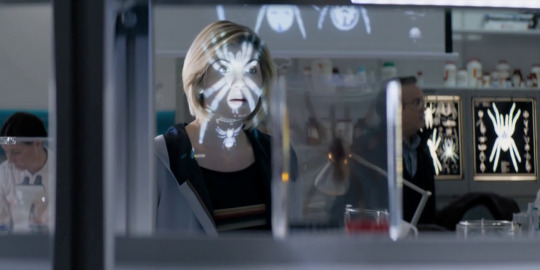
Hello friends! Over the weekend I had myself a pretty difficult time. I learned a friend of mine is dying and there’s nothing that can be done for it. Because of this, I am not sure how long or thought out this article will be. I might just touch on some key elements from last night’s episode. Either way, I do have half of a Twin Peaks article written, and Edge of Destruction has been viewed, so expect those soon. Also, a friend of mine asked me to submit an article for her zine, and I will be writing that for both this and the zine. You can probably expect that one soon as well!
So far Chris Chibnall has proven to be an interesting showrunner. I’ve not hidden my disdain for his writing at times, but in other ways, I really do enjoy his work. His scripts have the tendency to be like a box of bran cereal with a really cool toy at the bottom. There’s a lot that works, and there’s a lot that doesn’t. One of my biggest issues with "Dinosaurs on a Spaceship," was how dour and depressing it was at times. With a title like that, you’d expect something more lighthearted. When I saw the trailer for last night’s episode, my biggest hope would be that it was more akin to "Gremlins 2." Something kind of camp and silly, which in some ways we did get.
The episode opens in a large hotel in Sheffield. A man named Jack Robertson (a Donald Trump proxy) is discussing the logistics of a vague problem that could "cost [him] in 2020." The woman he’s speaking to, Frankie, is his niece’s wife, though he had to be reminded of this. So far, we don’t like this guy much. His bodyguard waits to whisk him off to his plane, while he tells Frankie to make their problem disappear, though she’s not so sure it’s that easy. Before they can discuss this any further, they are interrupted by a woman named Najia Khan, the general manager of the hotel. She’s there to check up on things before the grand opening. Very callously Robertson fires her (further solidifying his Donald Trump status, and his role as the hotel owner) seemingly for interrupting his nefarious meeting. He gives Frankie and hour to "make this all go away."
Before saying anything else, I would like to talk about that time vortex sequence! How cool was that? The last time we saw the time vortex in such intimate detail was "Timelash," which if you ask the fandom, was pretty bad. (Though I sorta love it for that.) Elements of it reminded me of the hyperspace scenes from "Babylon 5," and other elements reminded me of "Bill and Ted’s Excellent Adventure," how you could take certain avenues to sort of dial a point in time. The way the sequence segues into the console room was a beautiful bit of production value series eleven has needed. (Even those god-awful closeups were missing!)
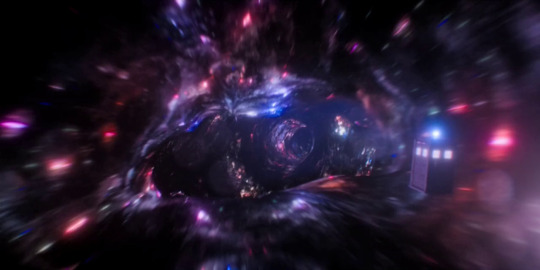
Watching the Doctor and her companions all fly the TARDIS, was kind of great. I was reminded of the scene in "Journey’s End," when the Doctor and his friends pilot the TARDIS together. I loved the idea of her still getting used to the controls. If you’ve not watched the video on YouTube of the production crew talking about the TARDIS interior, you really should. It’s a lovely glimpse into the design process. Not to be outshone, the exterior of the TARDIS, in its brilliant aqua blue, lands in Sheffield. This may be one of the Doctor’s best landings ever. She’s in Sheffield, it’s the right period, they’re right outside Yaz’s, and it’s only been thirty minutes since they were teleported away from the warehouse into the depths of space.
The Doctor made good on her promise- she brought her friends home. Looking like a kicked puppy, it’s more than obvious she doesn’t want to say goodbye. Yaz, picking up on this, invites her and the others up for tea. It’s a rather sweet scene. Graham, who’s not yet had any downtime to mourn since the funeral, decides to nip back home for a moment. Ryan offers to join, but Graham needs to do it alone. It’s a nice bit of character development between them. I rather loved it.
While heading into Yaz’s flat, the Doctor notices a worried woman trying to reach the occupant of a flat a couple doors down. She also notices a bit of spiderweb but doesn’t pay it much mind. Yaz lives with her family still, and we’re introduced to her dad and sister. I’ve been saying how I wanted a bit more Yaz, and this episode really delivers. Her dad is pretty much instantly likeable. He’s excitable, friendly, and has a personal project of keeping rubbish in the living room, or "evidence," as he calls it. It’s a conspiracy! Yaz’s sister is the typical bratty little sister. The banter they share was also charming. She teases Yaz that she’s surprised she even has friends. Yaz is usually too married to her job to worry about friends. Yaz counters with “At least I have a job to be married to.” I like sassy Yaz.
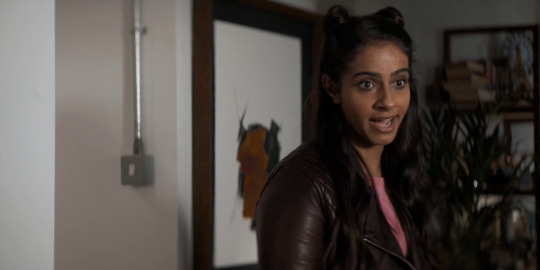
The Doctor is being her usual self- a bit weird. Marvelling at a couch is not exactly normal. Historically, she’s always been rather enamoured with the mundane elements of human life. Things like having a flat, going to work, watching a bit of telly, are all parts of a life she can never have. Yaz’s sister, Sonya, probes Ryan about his relationship to Yaz. She clearly has the hots for him. Yaz’s father, Hakim, wants to know if the police have followed up on the rubbish he’s collected. Before she can answer, Yaz’s phone rings revealing Najia to be her mother on the other end. She tells her she needs a ride home from work. (If you recall from my "The Woman Who Fell to Earth," review, I wondered if she didn’t have a mother, well she does!)
The sisters’ bickering as Yaz leaves, reminds the Doctor of her sisters. It also reminds her of the time she was a sister at an aqua-hospital, that actually turned out to be a training camp for the "Quiston Calcium Assassins." Ryan responds with "Going off on one again…" Which is what she’s doing right? Going off on a little tangent. Then why is it that the line really irked me? The Doctor is known for always telling stupid little stories, but this one really got to me. It’s right up there with suddenly having Audrey Hepburn or maybe Pythagoras’ sunglasses in her pockets. It’s a question of when. When would she have been a sister with some order of nuns?
The Doctor has always been male leading up to this point. So when would she be a woman in a past life to do this? When in this life would she have done this and not had Ryan around to have witnessed it first hand? If it’s just Chibnall trying to be cute, he’s really bad at it. It leaves you asking the wrong kind of questions, and for me, actually took me out of the story for a moment. Another implication is some "The Brain of Morbius" level fuckery indicating that the First Doctor, is not in fact, the first incarnation, which you could make an argument for. The War Doctor didn’t go as "the Doctor," which makes him "The War Doctor," and not "The Ninth Doctor." Another implication is that one of the past incarnations had a bit of a drag phase, which I could actually see. Both Two and Three have dressed in drag before. Either way, it’s a bad line and Chibnall should feel bad. (Ok rant over)
The Doctor notices that the Khans have a parcel to pick up from the neighbour down the way. She offers to go pick it up while Yaz’s dad cooks his terrible pakora. We’re now back with Graham at his home. We see more of that portentous spiderweb. The house is empty and feels lifeless. It’s the first time he’s been back home since Grace died and is haunted by her essence, as depicted by having Sharon D Clarke actually there as Grace. She talks to him about all of the little things around the house he’ll need to remember to keep the house in working order. He indicates that he has something else to tell her, but it’s left unsaid. He sits and smells her clothes, trying to remember her. Anyone who has ever lost a loved one can immediately identify with this. I found these moments with Graham and Grace very effective. He’s interrupted by a sound up in Ryan’s room, where he finds massive strands of spider web, and the moulted exoskeleton of a spider the size of a house cat.
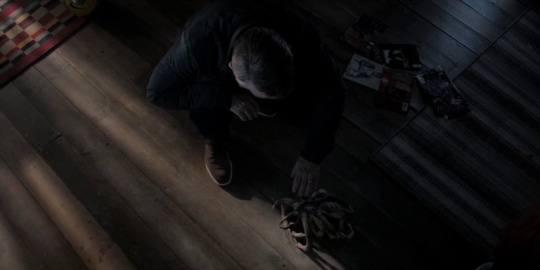
Graham isn’t the only one dealing with large spiders though. The Doctor and Ryan are about to discover these overgrown arachnids themselves. The parcel they’re picking up is at the same flat where the woman, we now know as Jade, was trying to reach her friend Anna. They both work in the same lab at their uni. After confirming Anna may be in trouble, the Doctor sonics the door open. Inside, the flat is covered in the same webbing as Ryan’s room. I’m reminded of "Mulholland Drive," where Naomi Watts and Elena Harring search the apartment of Diane Selwyn. Rather horrified, they discover the body of poor Anna, cocooned in spiderweb. "Spiders don’t do that, do they?" asks Ryan, but the Doctor asks a more important question- where is the spider that did this now?
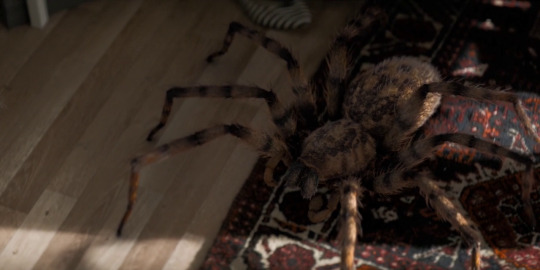
Many people are squeamish about spiders. My mate Gerry’s wife sat this episode out, due to an intense dislike of the little creatures. Which is why I found myself rather amused when they finally show the spider, and it’s actually a bit cute. It’s a brown house spider, once again, about the size of a cat, but it is rather aggressive toward the Doctor, Ryan and Jade. Using some quick thinking, the Doctor uses vinegar and garlic paste to keep the spider quarantined, as the noses in spiders’ feet are sensitive to these substances. She creates a sort of perimeter around the spider which seems to work. Now outside the flat, they meet up with Graham who has also seen some freaky stuff today! Graham gives Ryan a sealed letter that he found back home. It’s from his father, who if you remember correctly, didn’t attend Grace’s funeral. The Doctor asks Jade to take her back to the lab where she’s been testing on spiders. Hakim and Sonya are having pakora alone tonight it would seem.
The Doctor tells Jade she thinks she knows more than she leads on. She questions Jade about their experiments, but Jade defends their practices. They’ve been doing everything within the law. The spider carcasses are disposed of by a special containment unit. She doesn’t know why the spiders are mutating. Jade has been plotting out instances of giant spiders on a map in the lab. In what may be one of the most overused tropes in cinema history, the Doctor connects the dots with a series of lines all pointing to one centre point. It’s a bit stupid when you realise she could have just pointed at the centre point of the dots to the exact same effect, but that wouldn’t look as cool right? The centre point is, of course, the hotel Najia just got fired from, where she’s still waiting for Yaz.
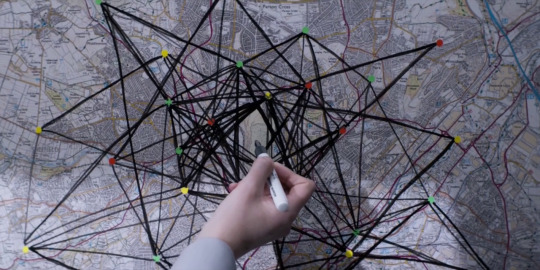
Frankie walks through a pair of doors marked with danger warnings, into an underground tunnel that looks like rock that’s been excavated by human hands. It’s full of spider web. Timid and afraid, Frankie moves forward with her camera phone but is taken suddenly to her doom by an offscreen spider. Back in the lobby, Jack Robertson and Kevin confront Najia and Yaz who has just arrived. I was slightly frustrated by the fact that Kevin pulls a gun on Yaz and she doesn’t mention once that she’s a police officer. Not once does she cite any kind of statute or even try and calm the situation as a police officer. They explain that Yaz was there to pick her up, but feeling antagonistic, Robertson wants to show Yaz how bad her mother is at her job, and why he fired her. He takes them to a room full of spider web.
While in the room, Yaz thinks she hears something through the walls but is called away by the Doctor who is now outside the hotel with Jade, Ryan, and Graham. Still in the room, Kevin and Robertson are confronted by a very large spider, about the size of a car. Robertson very cowardly leaves Kevin as bait as he’s dragged into the depths underneath the hotel to his death. Poor Kevin.
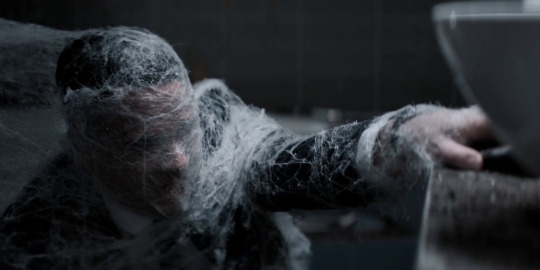
The Doctor, using psychic paper (a nice callback I was hoping to see) tells Robertson she’s there on official business and goes about looking for the source of the spiders. Ryan and Graham know exactly who he is, as he’s a bit famous. Their standing there grinning like idiots at Robertson was cute. I loved the bravery the Doctor shows when sticking her head into the giant spider-sized hole to get a peek, and what a peek she gets! She pulls her head back just in time as the giant spider lunges at her and they all sprint toward the exit of the hotel, which has now been completely webbed up, which it hadn’t been before. The spiders are trapping them in!
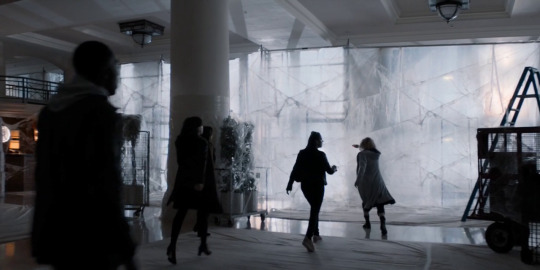
The Doctor refers to Yaz’s mum since she knows the hotel so intimately. They go hide out in the kitchen where everyone begins asking questions. The Doctor doesn’t seem to know who Robertson is, much to his annoyance. She rather humorously asks if he’s the Ed Sheeran she’s been hearing so much about. Robertson, it turns out, is gunning for the presidency in 2020, mostly out of disdain for Trump. So he can’t be all bad, right? Robertson butts against the Doctor’s authority, but the companions in a sign of solidarity let him know with no uncertainty that she’s in charge. The Doctor sends Ryan and Graham to capture a spider for Jade to inspect and takes everyone else to find a map of the hotel.
Graham and Ryan find a spider and catch it in a cooking pot, only to get chased down the hall by an agitated army of arachnids. It’s about the closest the spiders get to being actually scary in the entire episode. If you don’t suffer from arachnophobia, it’s really rather tame. The true villain, as it turns out, is capitalism. It’s revealed that Robertson built the hotel on top of an old mine that was used as a landfill. It’s a profitable endeavour from his perspective. Get paid to cart off a bunch of rubbish, find use for a disused mine, and build a lavish resort on top of it! This explains the rubbish Mr Khan had been finding sprouting up all around Sheffield. While looking over maps, Najia wants to know how Yaz knows the Doctor and even asks if they’re in a relationship. The Doctor naively asks Yaz if they are, as she’s been ignorant to this sort of thing in the past. (Be still my heart.) They find the entrance to the mine on the map and set off.
As they barge past the danger doors, Robertson protests, trying to use his powerful status to keep everyone from discovering his dirty secret. He tries to stop Najia, and in what may be the best line of the episode she defiantly looks him in the eye and says "You’re not the boss of me anymore." Oof. Good one, girl. Now inside, they find the bodies of Frankie, Kevin, and several others, all of whom met the same fate as poor Anna. Even the callous Robertson can’t hide the tinge of guilt on his face, though it doesn’t stop him from pocketing Kevin’s web caked gun. Anna, who had spider pheromones on her from the lab, attracted spiders to her home from this location. (Why neither Jade nor the lab had been affected, or why they were attracted to the O'Brien homestead is anyone’s guess.) In a very "Teenage Mutant Ninja Turtles," moment, it’s revealed that the toxic waste of gases building up, and the improperly disposed spider carcasses created a sort of mutagenic stew to breed giant mutant spiders. It’s all a rather stupid explanation, but I kind of love it for that. It was Laird and Eastman’s Doctor Who. I’m all for it.
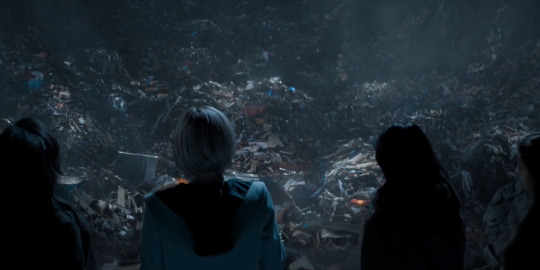
Back in the kitchen, Jade tells Ryan and Graham she needs a bigger specimen, which basically is only written in as an excuse to give the two of them something to do. It’s a bit sloppy and doesn’t go anywhere. It does, however, give us a nice opportunity to have a bit of a heart to heart between Graham and Ryan. Ryan tells Graham that he read the letter from his father. He mentions he doesn’t like that his father referred to himself as the only proper family Ryan had left, indicating that he still thinks of Graham as family. Does this mean we might hear him call Graham "Granddad," soon? Their heart to heart is cut short, however, when they are confronted in the ballroom by a giant spider.
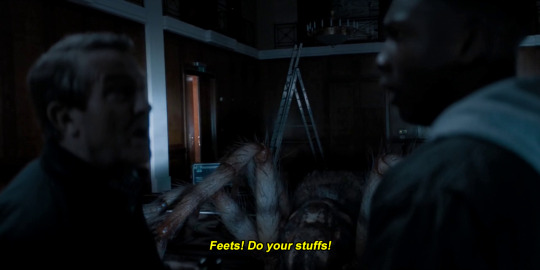
Once again, the spiders aren’t very scary, as the two of them escape rather quickly and they’re back in the kitchen. Why the kitchen has been established as the safest place in the hotel, is still unknown, but Yaz’s mum said! Robertson reveals he has a panic room installed in the hotel. He has one in every hotel, as he’s a bit of a paranoid guy. When he had it installed in case the poor ever decided to rise up and eat the rich, I’ll bet he didn’t foresee them being spiders! The panic room has an ocular scanner, a small green laser that really should have blinded him if I’m being honest, but hey, it looks cool! In the panic room, Robertson has enough food and drink to survive for six months. He also had a rather swank entertainment system with a flat screen and giant speakers. Using Ryan’s phone, the Doctor devises a plan! (Always with Ryan’s phone, that one.)
The next sequence is something akin to the campiness I was hoping we would get from this episode- hip hop spiders! Drawn to the sick beats from Ryan’s phone, and Robertson’s sound system, the spiders all gather inside the panic room where the Doctor and her friends trap them inside. Robertson, however, has become increasingly paranoid in the face of being the least powerful man in the room and has decided to take refuge in the safety of his gun.
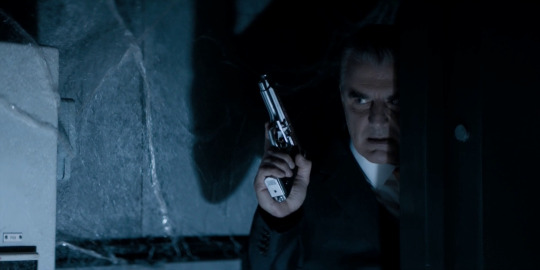
The Doctor puts together a very "Ghostbusters," style backpack garden sprayer filled with peppermint and tea tree oil diluted in water. She plans on using this natural spider repellant as a way to wrangle the big spider that chased Graham and Ryan in the ballroom. After all, there’s the Sheffield Comic Con there in a week, they need it empty! However, the spider is behaving strangely. Under the weight of its own mass, the poor beast is struggling to breathe. The Doctor takes pity on it, and apologises to it, as she knows it’s going to die. Then the real monster enters the room in the form of Robertson wielding a gun. He fires a single shot into the spider, killing it, and angering the Doctor.
Now back at their homes, the companions all seem to be slightly removed from their roots. Before walking out of her flat, Yaz is told by Najia she still wants to know how she came to know the Doctor. There’s a sort of Jackie Tyler "I want to know who my daughter is out galavanting with," element to her questioning that I liked. They all convene back at the TARDIS, still parked outside Yaz’s. The Doctor invites them in, expecting to have to say goodbye. Instead, they decide they would rather travel with her. Graham says he’d rather grieve with her, than in an empty house. Ryan has no desire to resume working in a warehouse, and Yaz wants to see the universe. I rather like the responsibility the Doctor has been taking with her companions’ safety, as she tells them in no certain terms, that travelling with her will be dangerous. They all accept, and the Doctor christens their new "fam," as "the TARDIS team." Then, all together, they pull the lever and the TARDIS takes them on their next adventure!
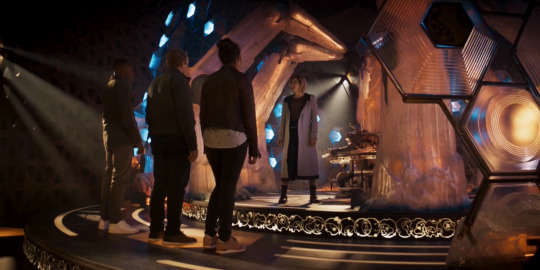
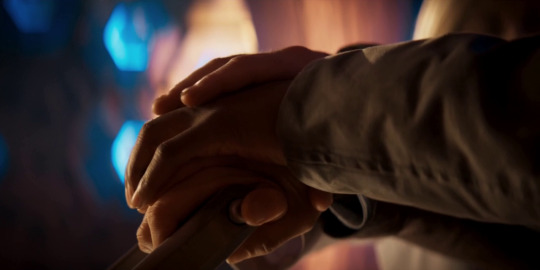
And that’s it, really. Which I must say, was a bit disappointing. Not the entire episode, but the ending. It sort of fizzled out. While I was actually rather pleased to see the spiders weren’t treated as big evil monsters, it would have been nice to actually have some sort of final showdown. Maybe Ryan gets webbed up and they had to save him before it was too late. Something. Sadly, most of the danger was short-lived, or off camera. Also, what actually happened with the spiders? Will they spend the rest of their lives listening to garage beats? How many of them were still out in the wild? Did the waste get cleaned up? Will there be a public outcry? Are there more people dead in their homes, wrapped in a gauze of spider web? What’s the difference between killing spiders outright, and starving them in a panic room? Lots of unanswered questions.
I liked that they gave us more interior shots of the TARDIS. I liked that the console room still has Gallifreyan written somewhere. With as much change as the show has gone through, it’s nice to see that continuity. Speaking of change, Jodie Whittaker continues to sparkle as the Doctor. But I did have some issues with her role in this episode. Aside from wrangling spiders, and figuring out what was happening, the Doctor doesn’t actually do much in the episode. I mean, did she do anything to ensure this won’t continue to happen?
While I rather liked Jack Robertson’s campy turn as the villain, even his story seemed to fizzle out. Considering the Doctor had once taken down the prime minister with six words, I expected her to give Robertson a warning or something. But alas, he, like every villain this season, lives to fight another day. Doctor Who writer Paul Magrs said on twitter recently that Missy would have made them into mincemeat by now, and I’m inclined to agree. The Doctor and her crew have yet to really face a truly terrifying foe. The stakes have been disappointingly low. I’m beginning to expect we’ll see a sort of legion of men scorned by the Doctor come together at the end of this series. Perhaps they’ll form a society of the Doctor’s evil exes. Is this all turning out to be one big metaphor for misogyny? Maybe. Regardless, I must say I rather enjoyed this one.
#doctor who#arachnids in the uk#thirteenth doctor#jodie whittaker#chris chibnall#graham o'brien#ryan sinclair#yasmine khan#yaz#time and time again#bbc#tardis
11 notes
·
View notes
Text
OUR FIRST GAY ALIEN OF THE NEW SERIES GOD BLESS
26 notes
·
View notes
Text
Doctor Who review - Spyfall Part One
Spoilers! Obviously.
If you haven't watched the New Year’s Day episode, the first of the 2020 series, then go watch it now. Seriously, watch it before Sunday’s episode.
Spyfall Part One sees The Doctor, Yaz, Ryan and Graham summoned to MI6 headquarters to uncover a deadly threat to spies across the world.
Here’s the link to watch it on BBC iPlayer : https://www.bbc.co.uk/iplayer/episode/m000cs1y/doctor-who-series-12-1-spyfall-part-1
A full year on from the previous episode, Resolution, which saw Jodie Whittaker’s Thirteenth Doctor face a classic enemy, Spyfall Part One had to find a way to up the ante. On top of that, Holiday Specials have to balance pleasing existing fans and keeping potential new fans engaged - a tall order after what will have been a boozy New Year’s Day dinner for many UK households! But on both counts Spyfall Part One delivers.
Showrunner Chris Chibnall has faced some criticism for his choices overseeing Doctor Who, including a little from me, but bagging Stephen Fry and Lenny Henry for this series opener is a master stroke. It is those two star turns that lull the audience into a false sense of security.
Fans may remember third guest star Sacha Dhawan for appearing as early Doctor Who director Waris Hussein in An Adventure in Space and Time. Many will have assumed, as I did, that he’d have a small role in Spyfall, in the vein of Jessica Raine’s appearance in Matt Smith story ‘Hide’ after she played Verity Lambert in the 50th anniversary docudrama.
Before we meet the O character, he seems as though he may be the Felix Leiter to The Doctor’s James Bond. After being shown around his home, he evokes the Clive character from the 2005 episode ‘Rose’. Later on, the unassuming analyst appears to start wooing Yaz. But the truth is much stranger, and we’ll get there in good time
Three creepy, perplexing, alien attacks give the episode a nail-biting cold open, before Segun Akinola’s excellent interpretation of the iconic theme music kicks in, over the purple gloopy title sequence. Then we’re back in Sheffield, checking in on the Doctor and her fam.
Ryan’s barely keeping on top of the medical excuses he’s been giving his basketball-playing mates, rather than explain his Tardis adventures. Yaz appears to have had The Doctor fake paperwork for ‘secondments’ from her police station, to keep her boss off the scent, if not her mother. And a GP visit gives Graham a chance to reflect. He misses his wife, but everything else is fine, and he’s still enjoying ‘travelling’. Which just leaves The Doctor. She’s still in Sheffield too, tinkering with the Tardis - but enough about emptying the water slides, who are the suits pestering the fam, and who do they work for?
Well, they are being cagey, but The Doc’s not bothered, so visiting their boss is a solid plan to discover more, until the satnav kills the driver. And sends them speeding through traffic, in reverse. Luckily, The Doctor realises that a killer laser can be deflected back on itself, stopping whatever took over the car in the nick of time. Panic over, but now the car is speaking like Stephen Fry! Aha! He’s just playing C, head of MI6, so The Doc takes the wheel to get them to London for a proper chat.
C’s never met The Doctor, and is expecting a man - “I’ve had an upgrade!” grins Thirteen. She asks after a mutual friend, O, who The Doc wants on the team, particularly after examining what’s left of one of the fallen spies. And with both UNIT and Torchwood gone, they’ll need all the help they can get.
C has intel that powerful tech CEO Daniel Barton (Lenny Henry) may be involved in the spy attacks, but C notes that O has left MI6 since he met The Doctor. C sacked him, and now he’s off-grid. Thirteen Whatsapps O and gets a picture of some fish. And with that, C leaves the story, another victim of whatever can hack a satnav to fire lasers. Still reeling from the shocking loss of Stephen Fry, barely 15 minutes into the episode, the gang then come face-to-face with the story’s spy-attacking aliens, who emerge from the walls, tattooed by whatever was hanging on them.
The fam flee to the Tardis, but one of the aliens starts pressing in through the Tardis doors, as The Doc decodes O’s fish photo is his location. Steganography!
With no other leads, The Doctor sends Yaz and Ryan undercover, and they discover that Daniel Barton is only 93% human, and that he’s in league with the aliens who have been attacking spies. Meanwhile, The Doc and Graham arrive at O’s place, where we learn that O’s belief in aliens was mocked by MI6, so he took his research with him, including some stuff about The Doctor. After acing their mission, Yaz learns the hard way that those spy attackers can hit you with a blinding light, sending you somewhere weird. Luckily though, they can pop you from there to somewhere else just as quickly. In this case, in place of an alien O had trapped in a cage after an attack on his surprisingly well defended home.
There’s little time to ponder all that though, except to say, Daniel Barton has some questions to answer, and, luckily, a birthday party to catch him at. But the search engine boss doesn't like The Doctor’s queries, and a chase ensues. The fam and O catch up to Barton as he gets on one of his planes, but when they all clamber aboard, he isn't there. So who's flying the plane? And what was that about O? And there's a bomb on the plane! What O? The plane’s gonna fall out of the sky! Where’s O gone? What did he say? And now The Doctor disappears, sent to that somewhere weird place by the aliens, leaving Yaz, Ryan and Graham aboard, helpless.
And then the credits roll.
Blimey!
Sometimes, the first parts of multi-episode stories can be all set up, no action. Not this one.
I am very excited to see how this story ends, and I’m very pleased that this series has kicked off with such a cracking episode. Congratulations to Chris Chibnall and everyone else involved!
And, if you’ve read this far and still haven't watched the episode, go do it now, you won't regret it.
Here’s the iPlayer link again: https://www.bbc.co.uk/iplayer/episode/m000cs1y/doctor-who-series-12-1-spyfall-part-1
0 notes